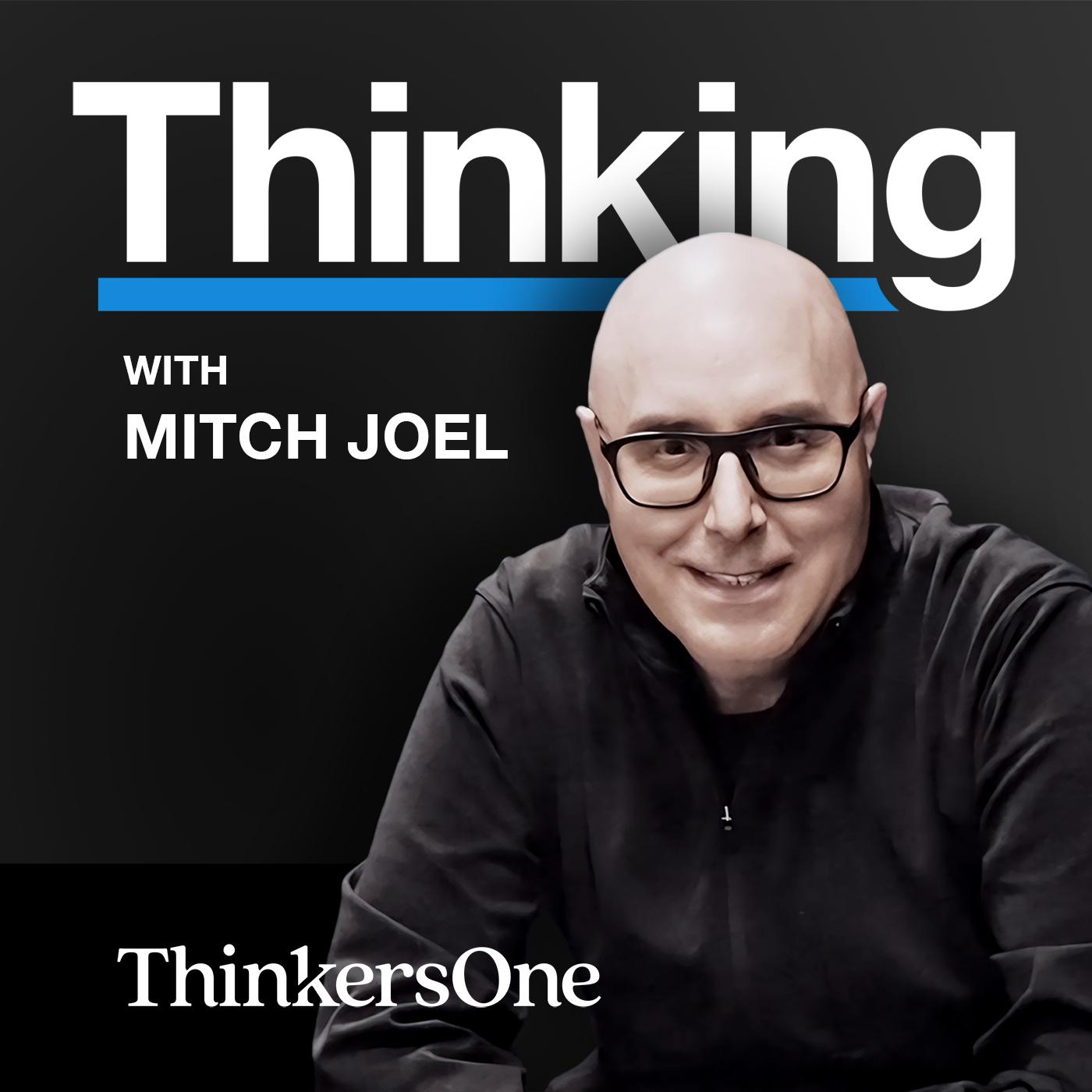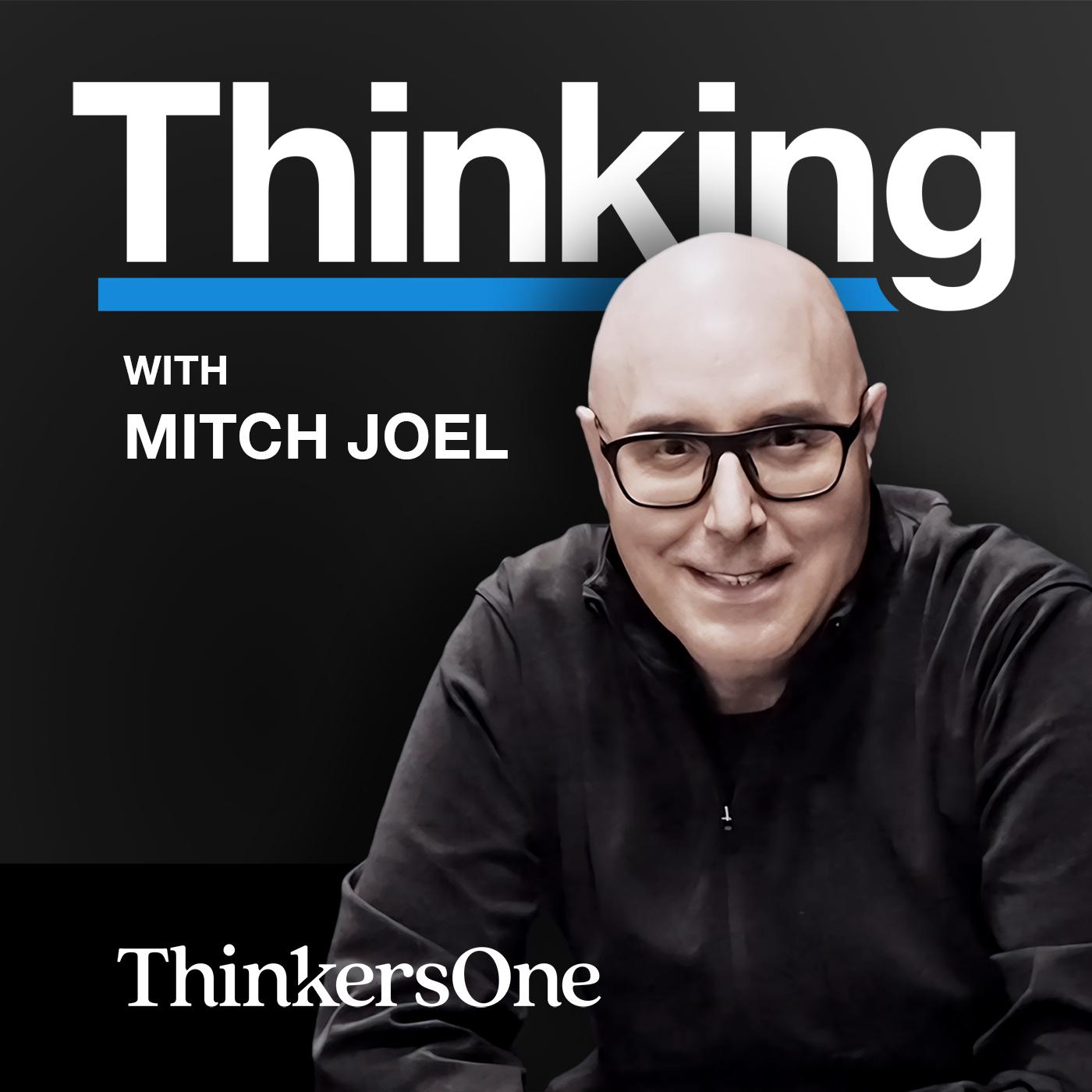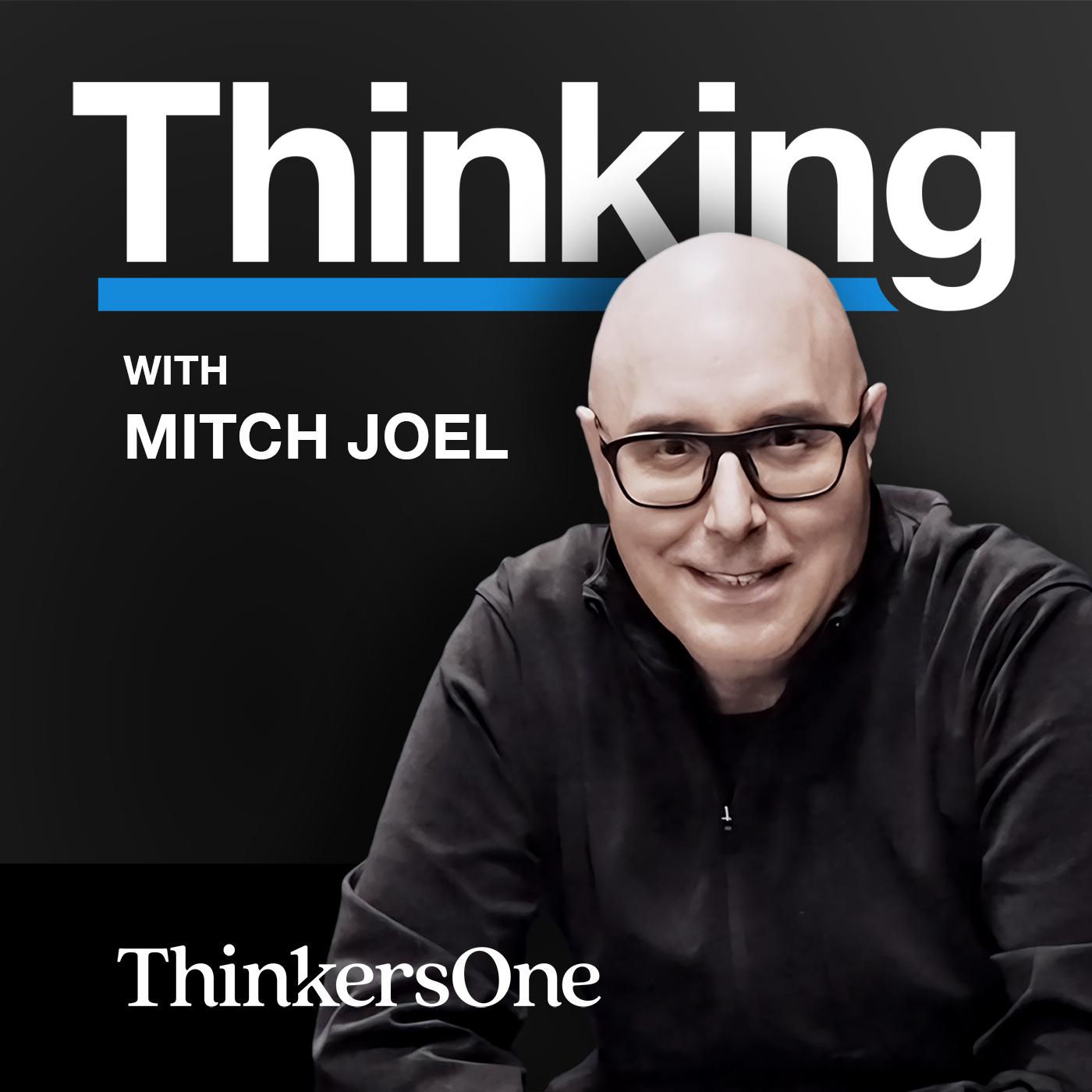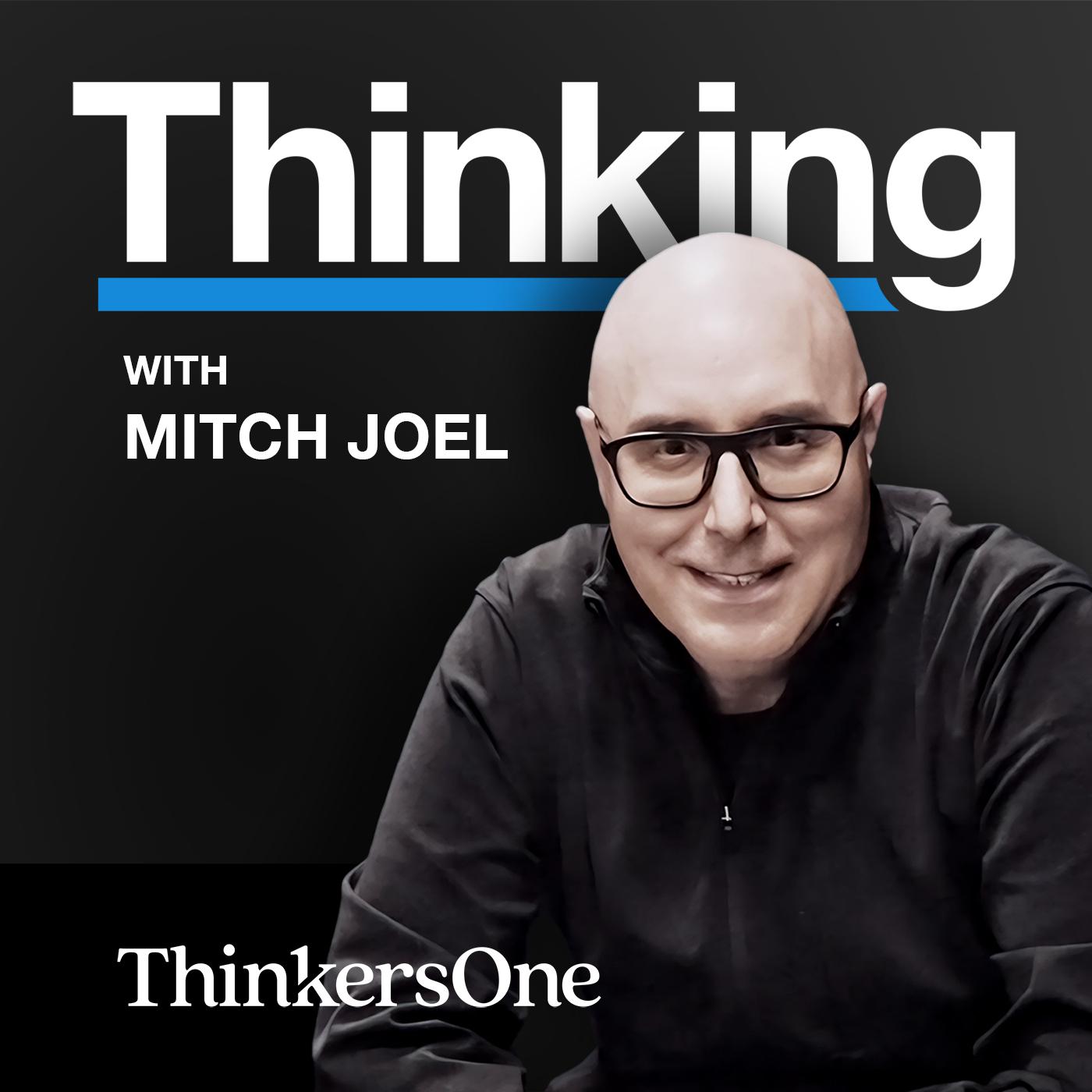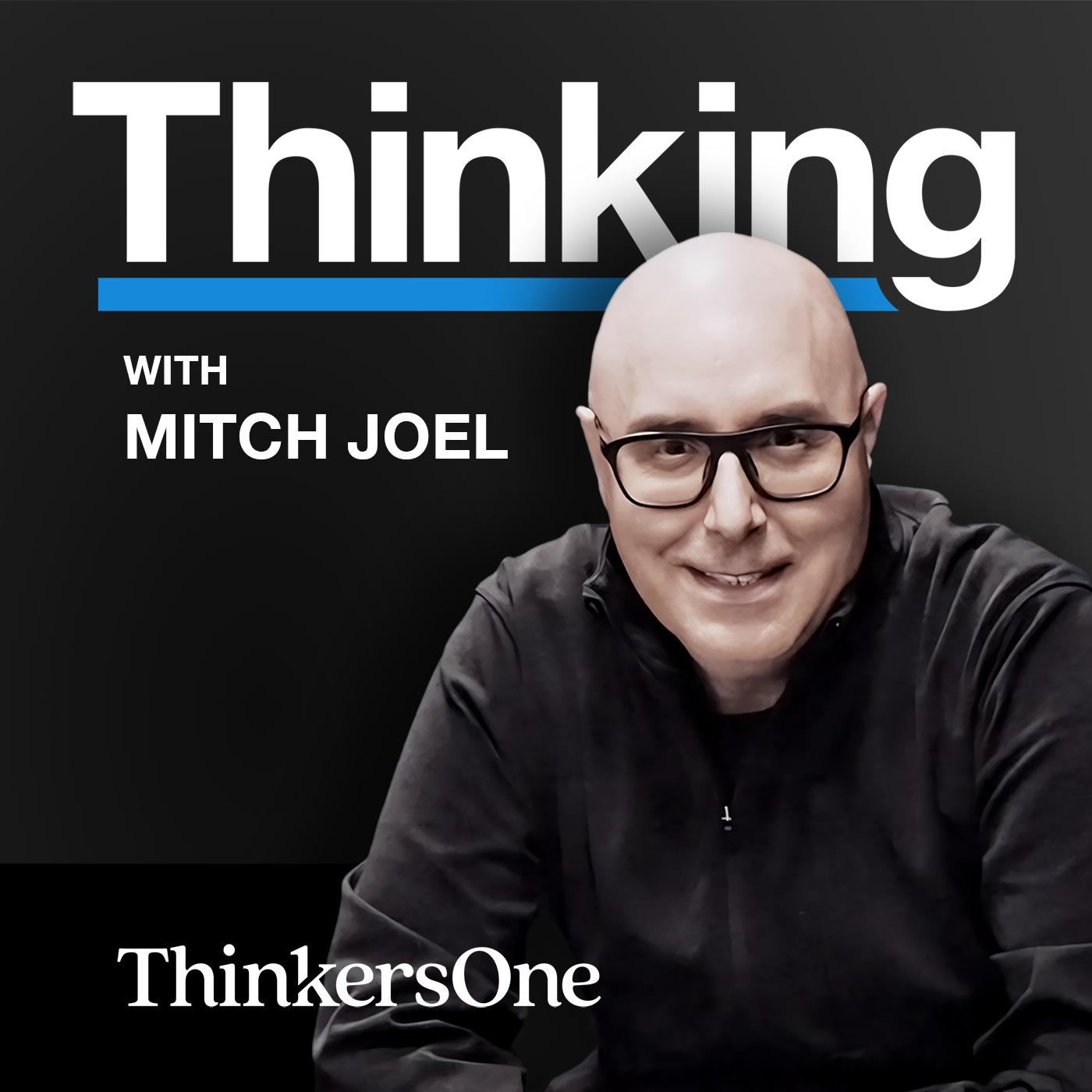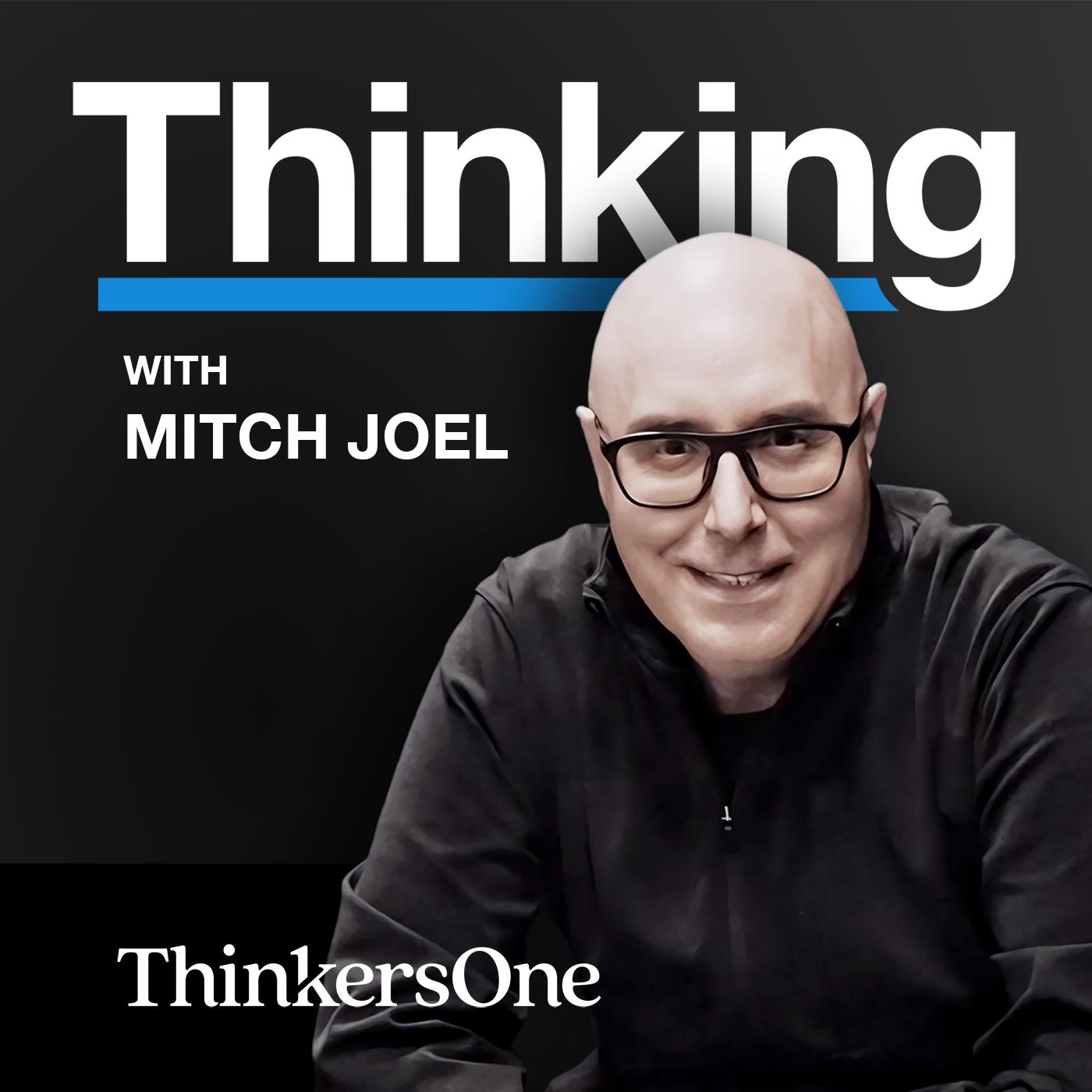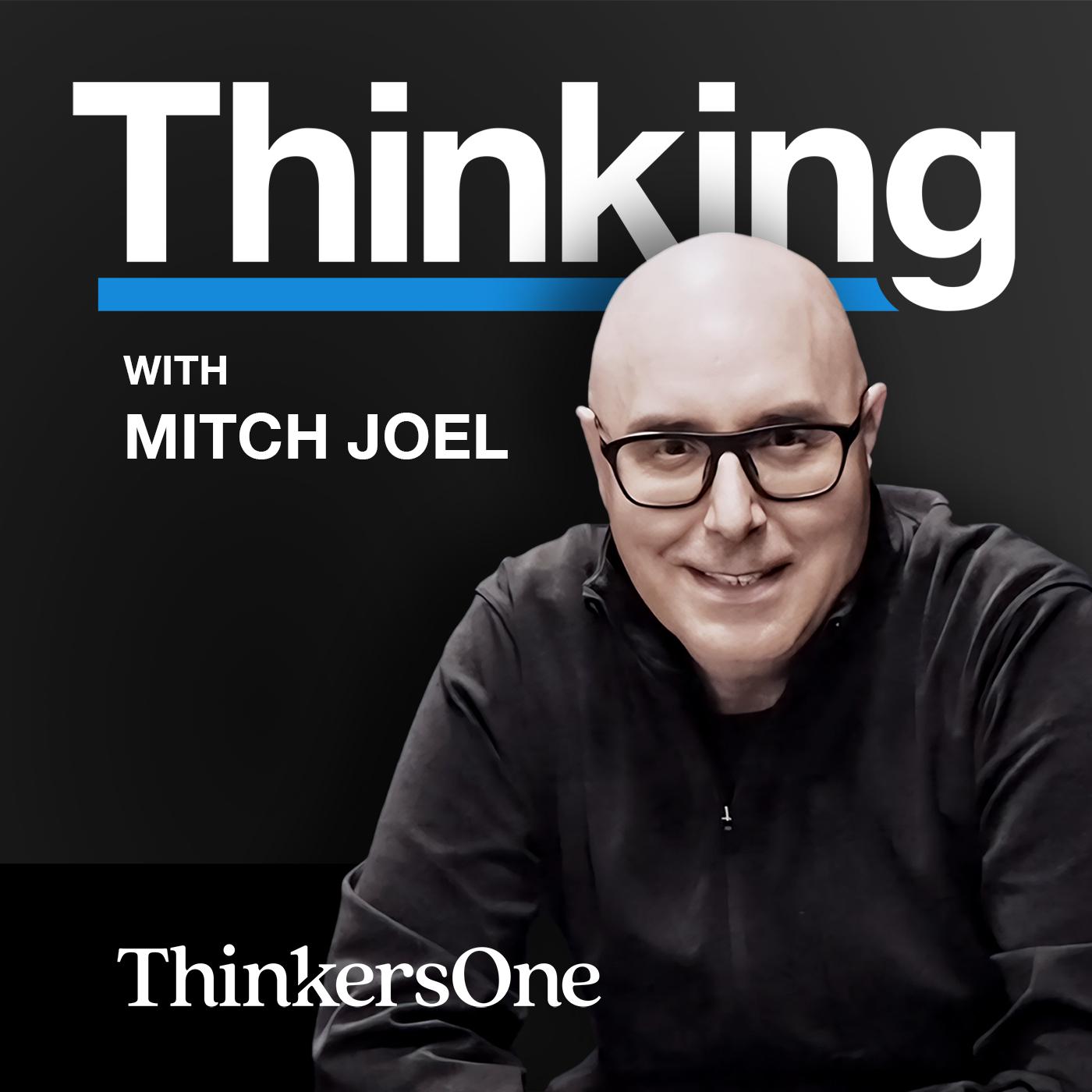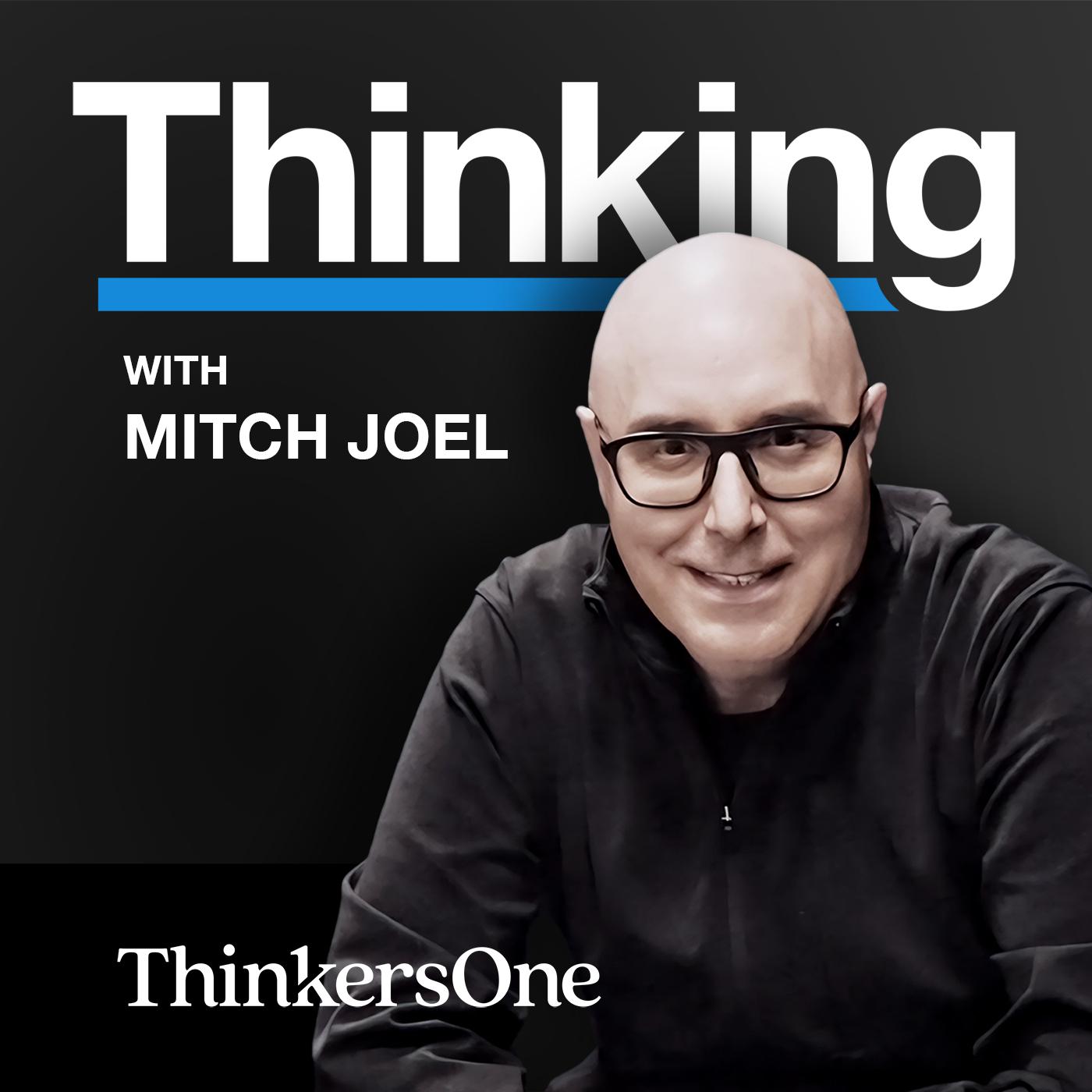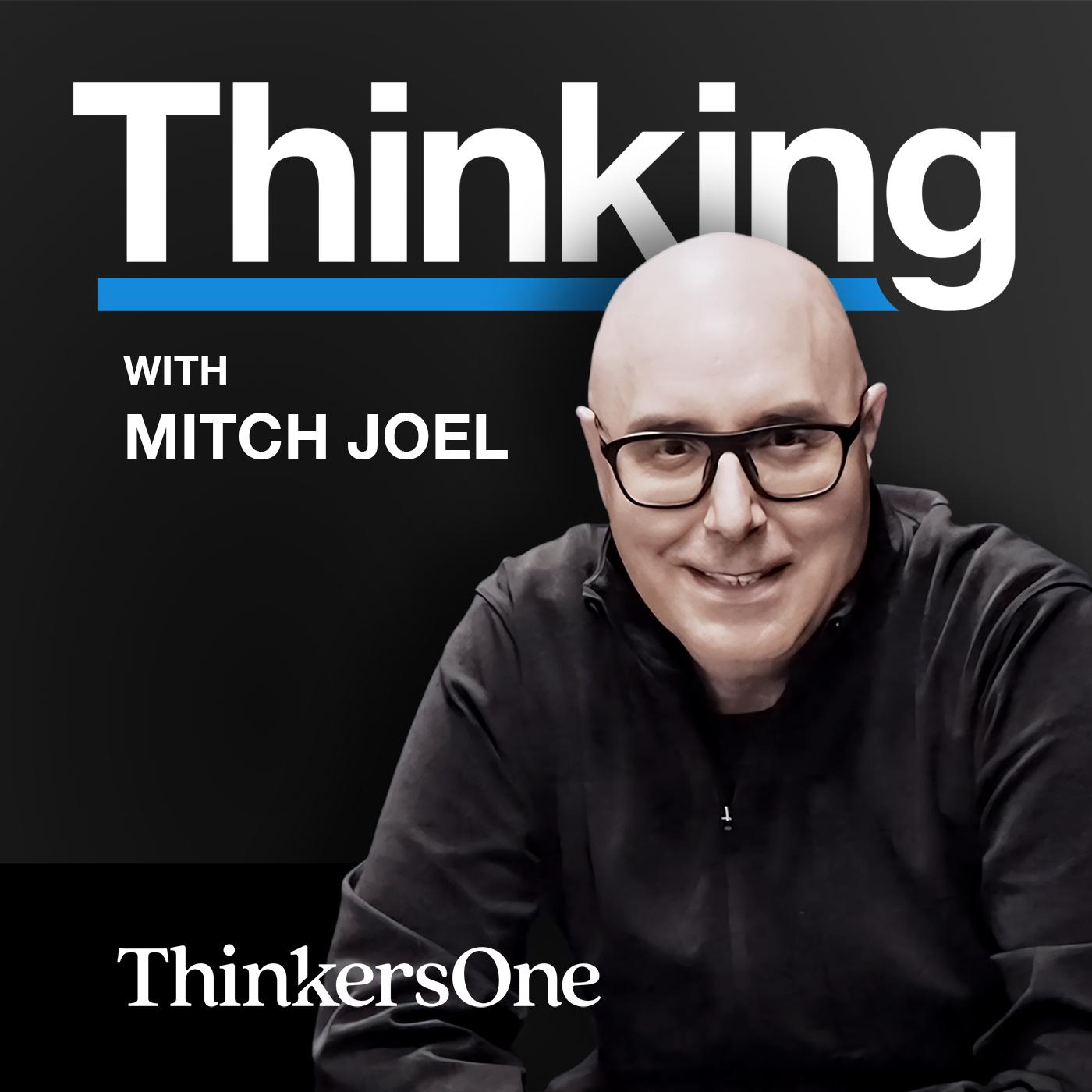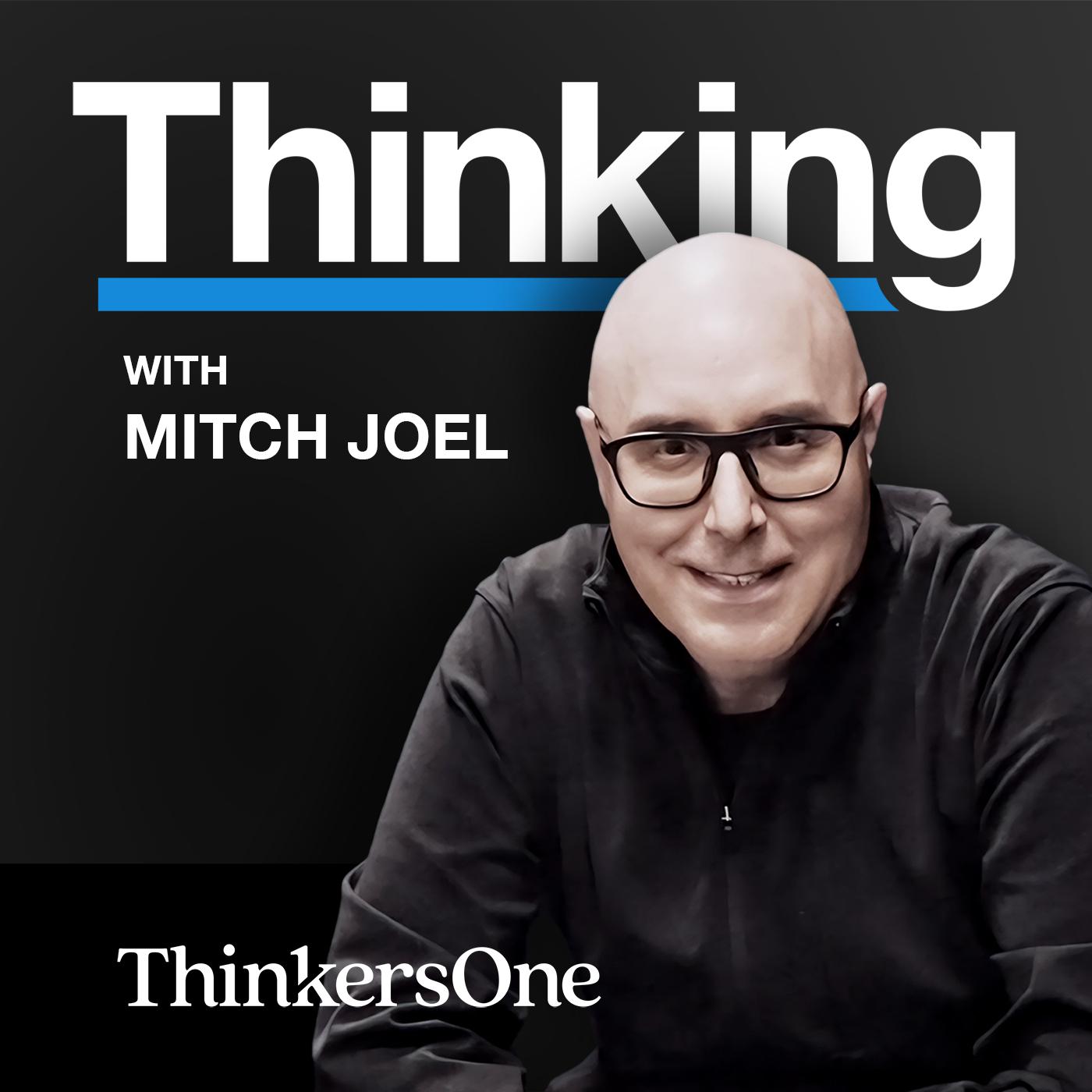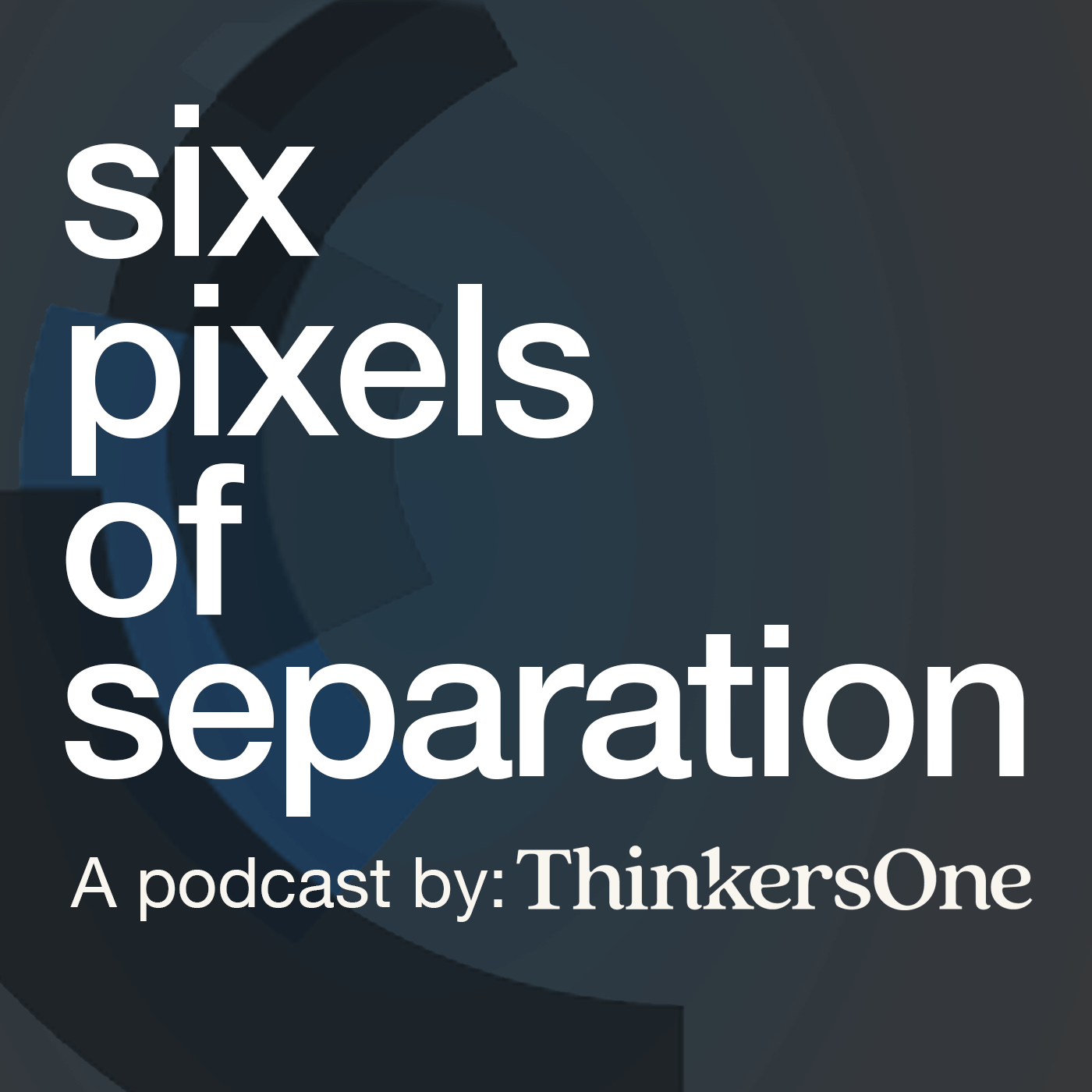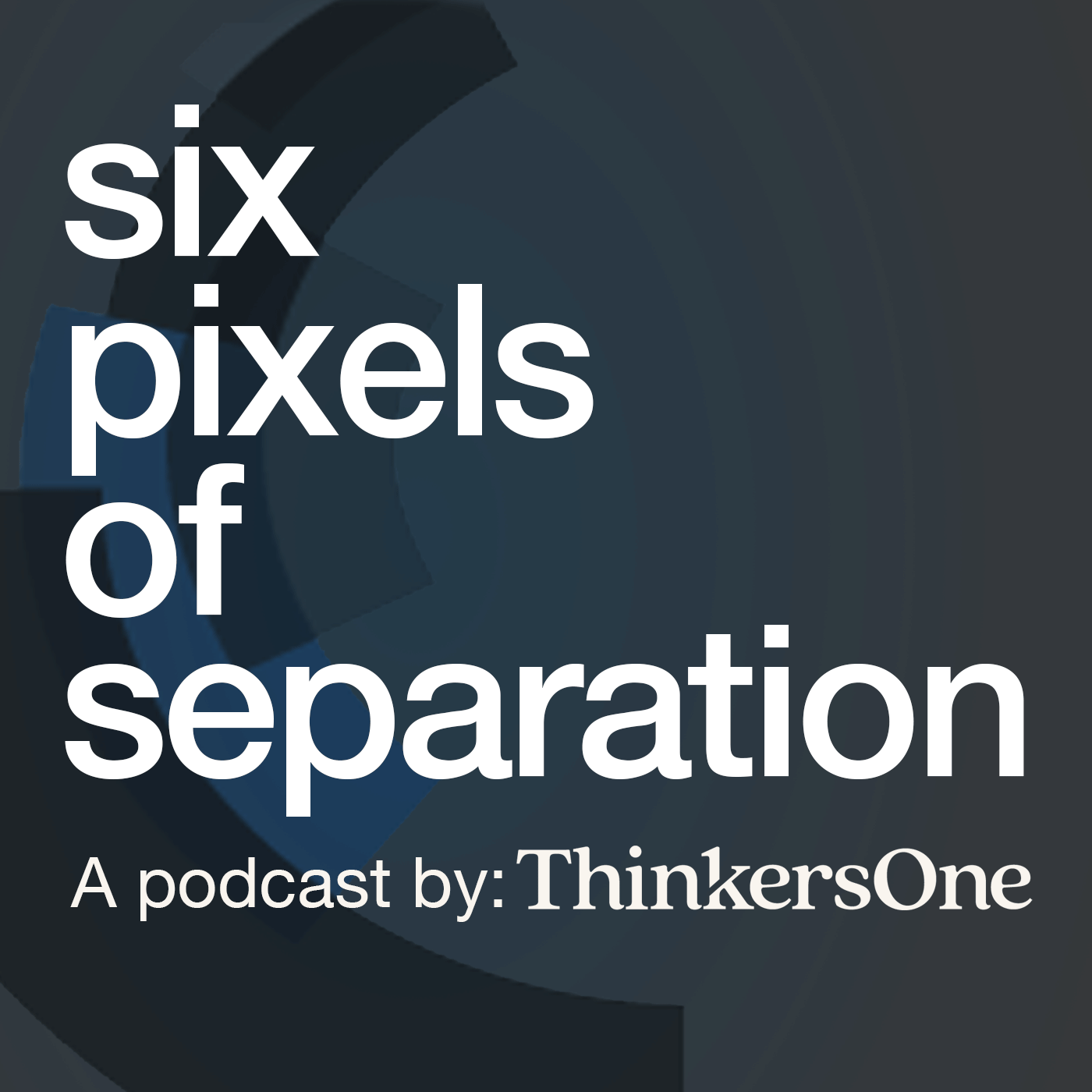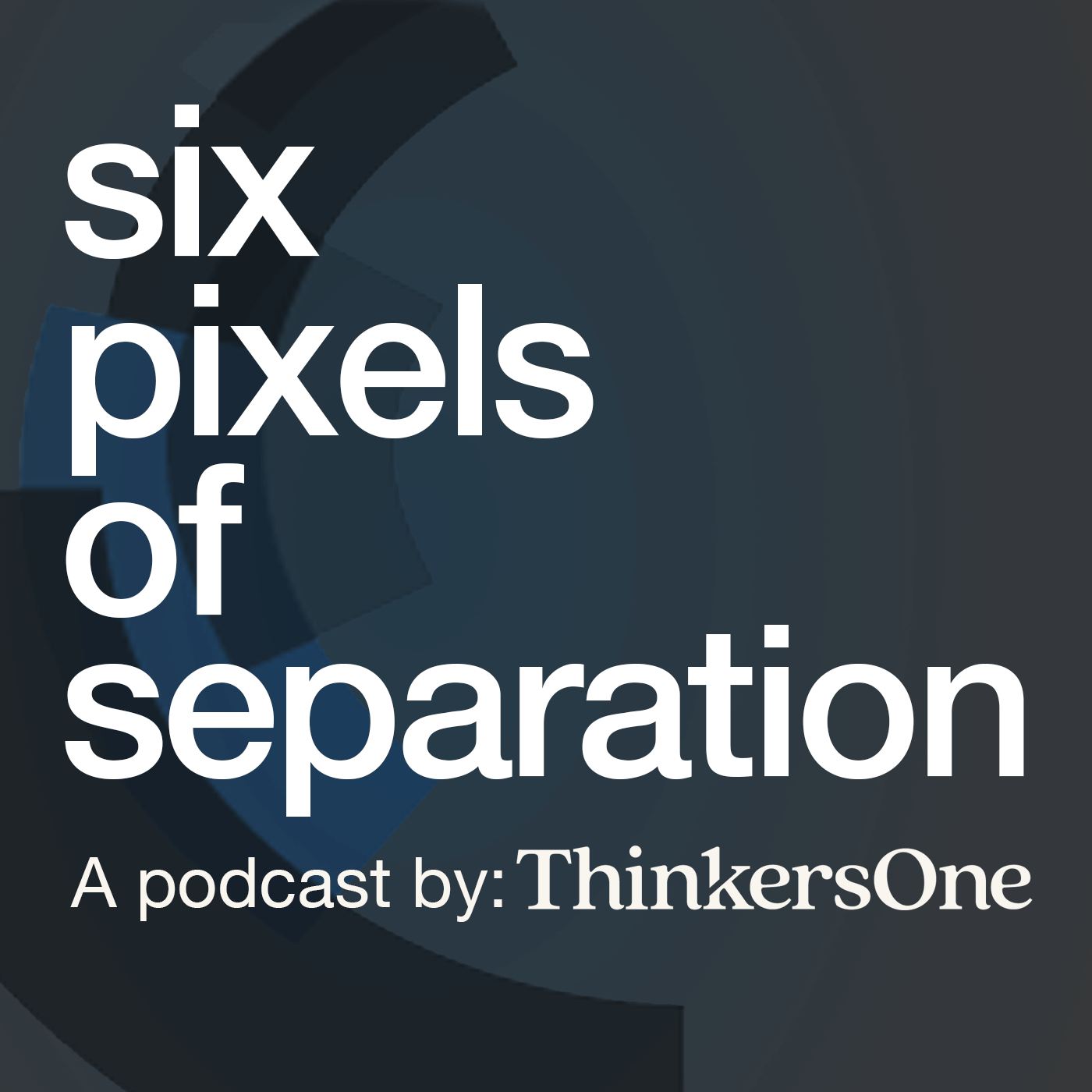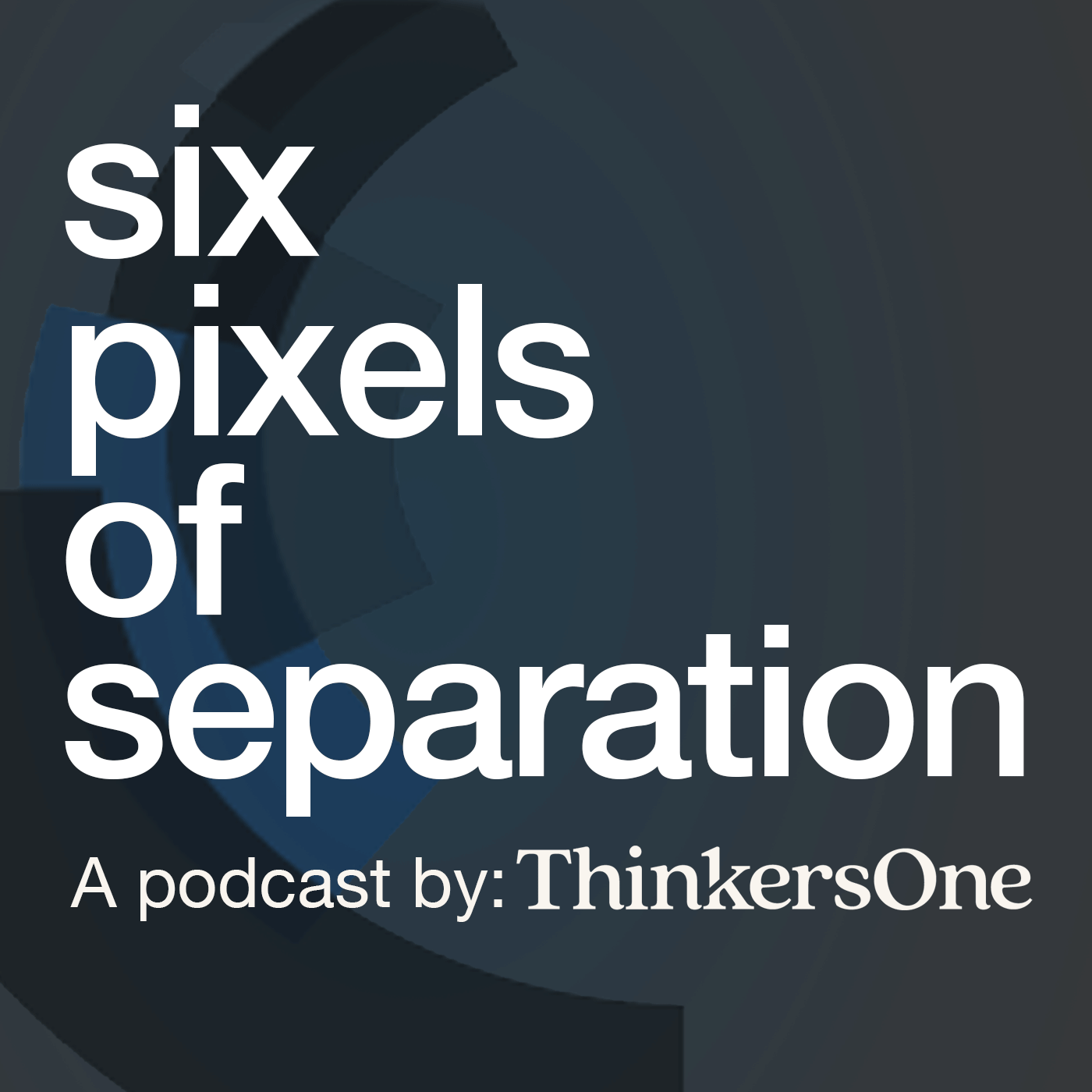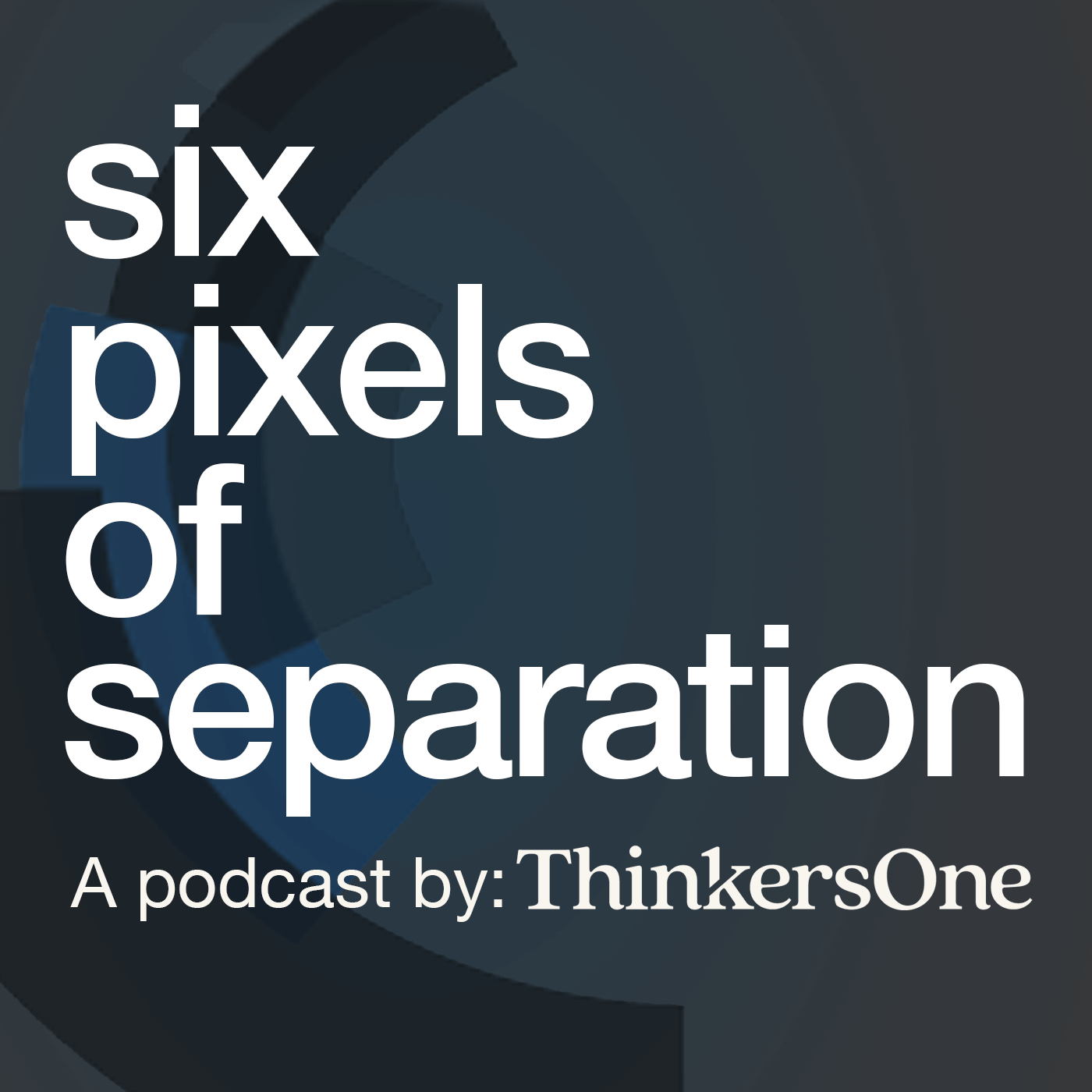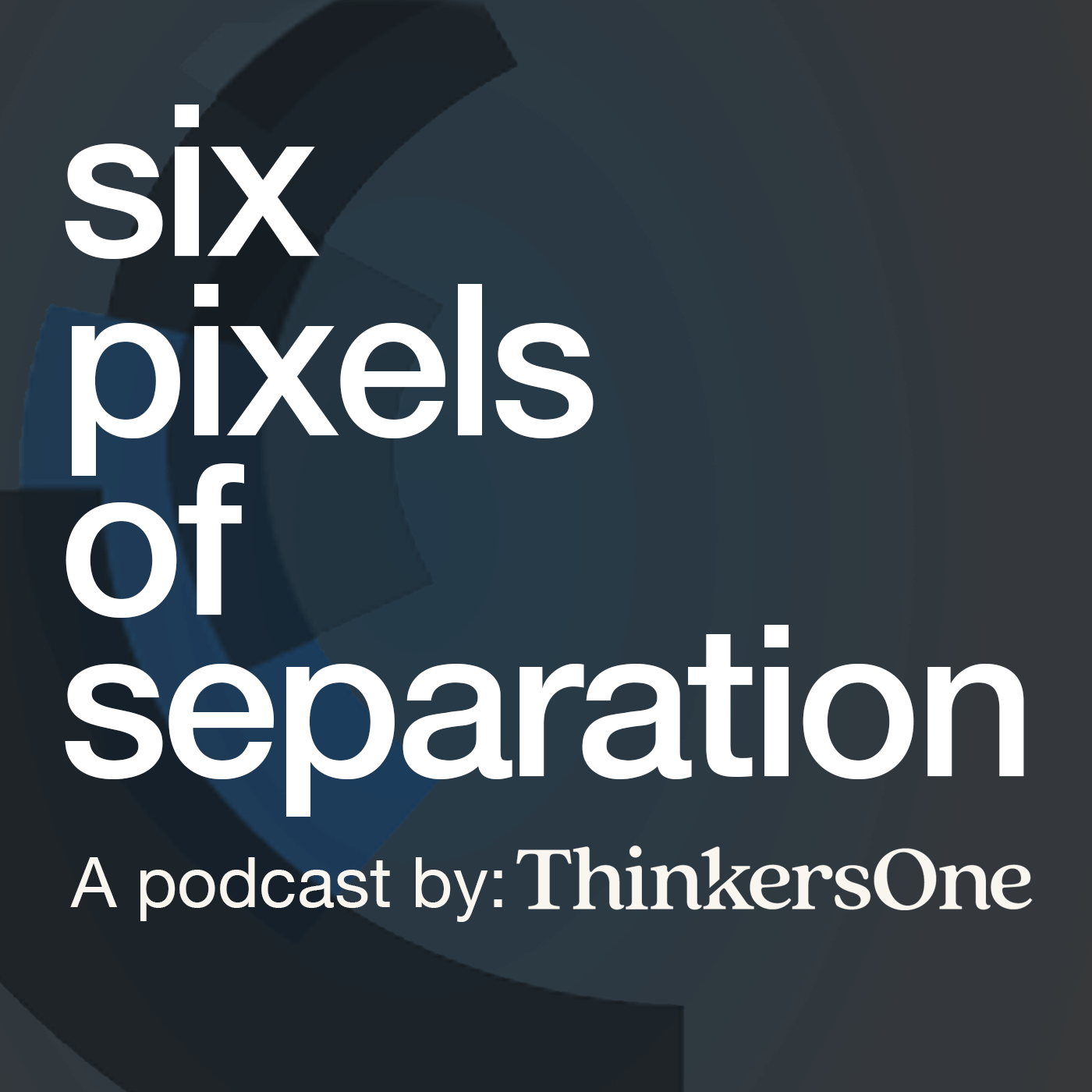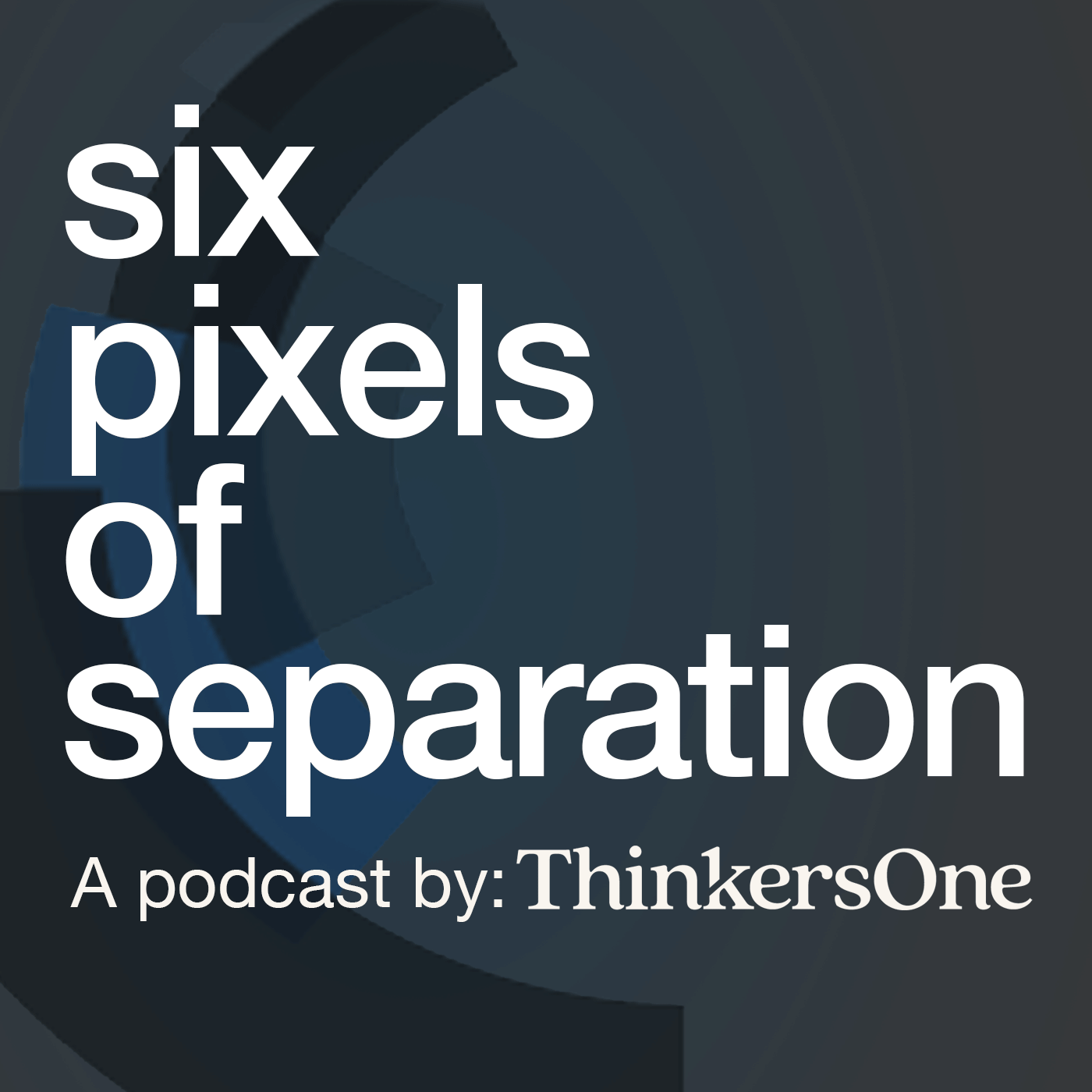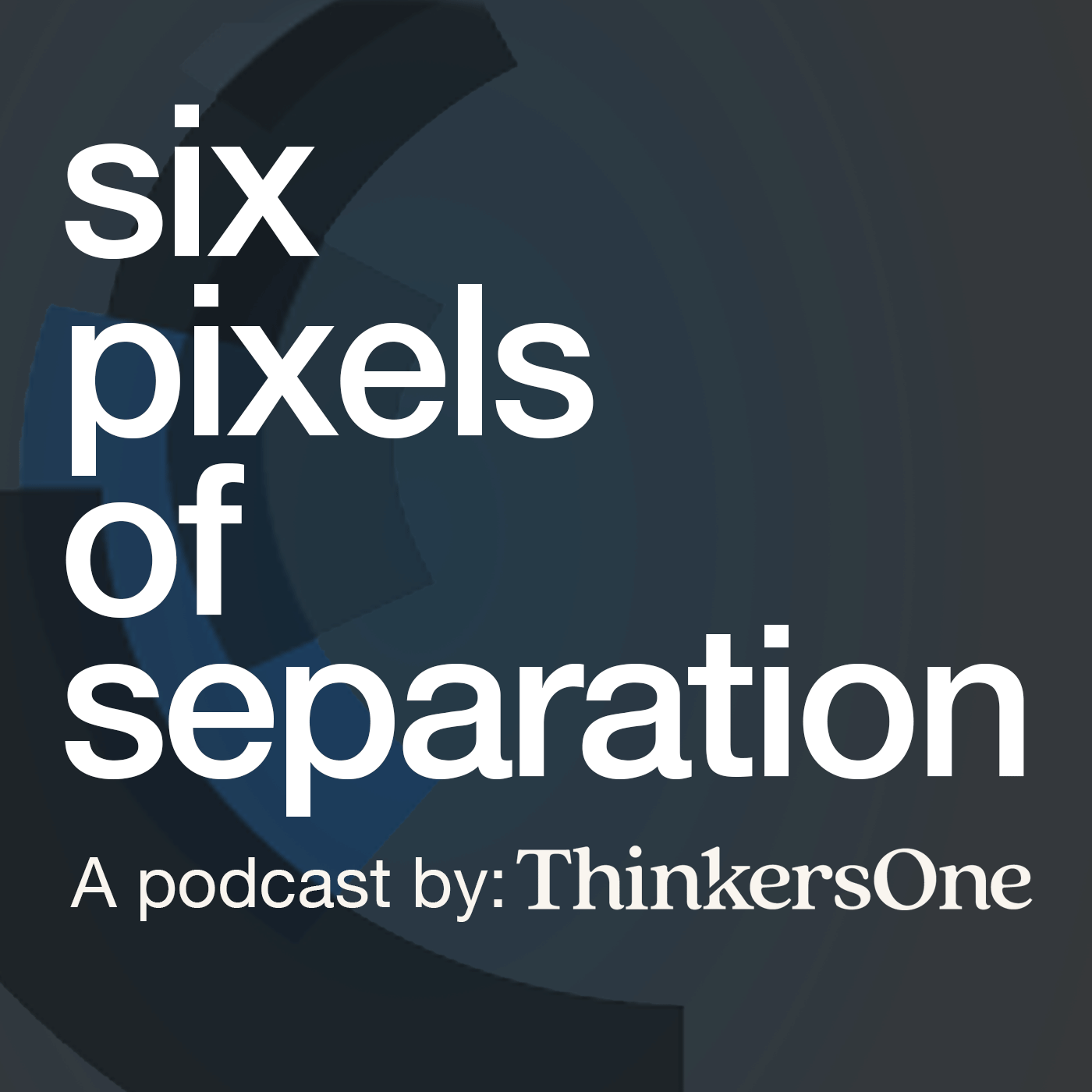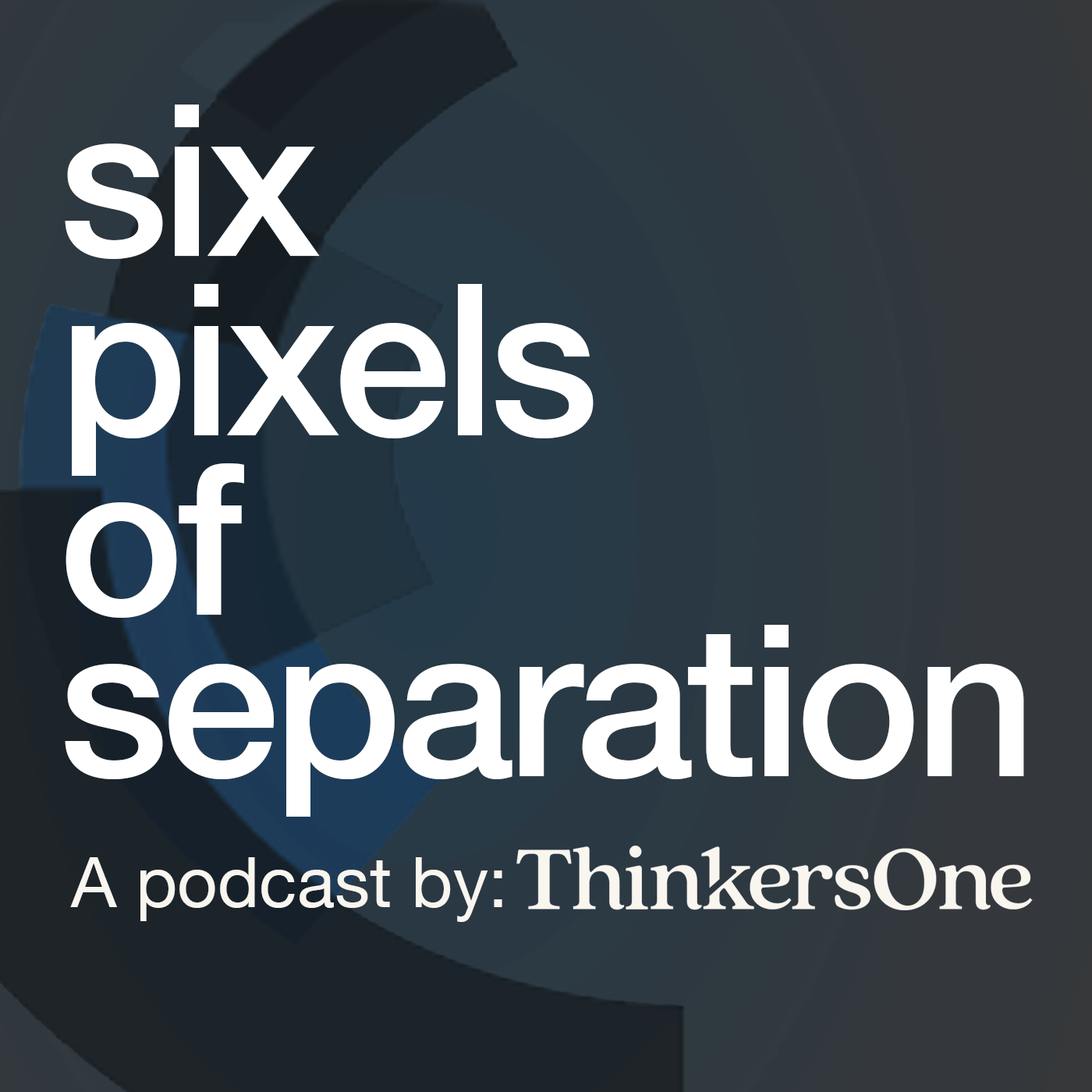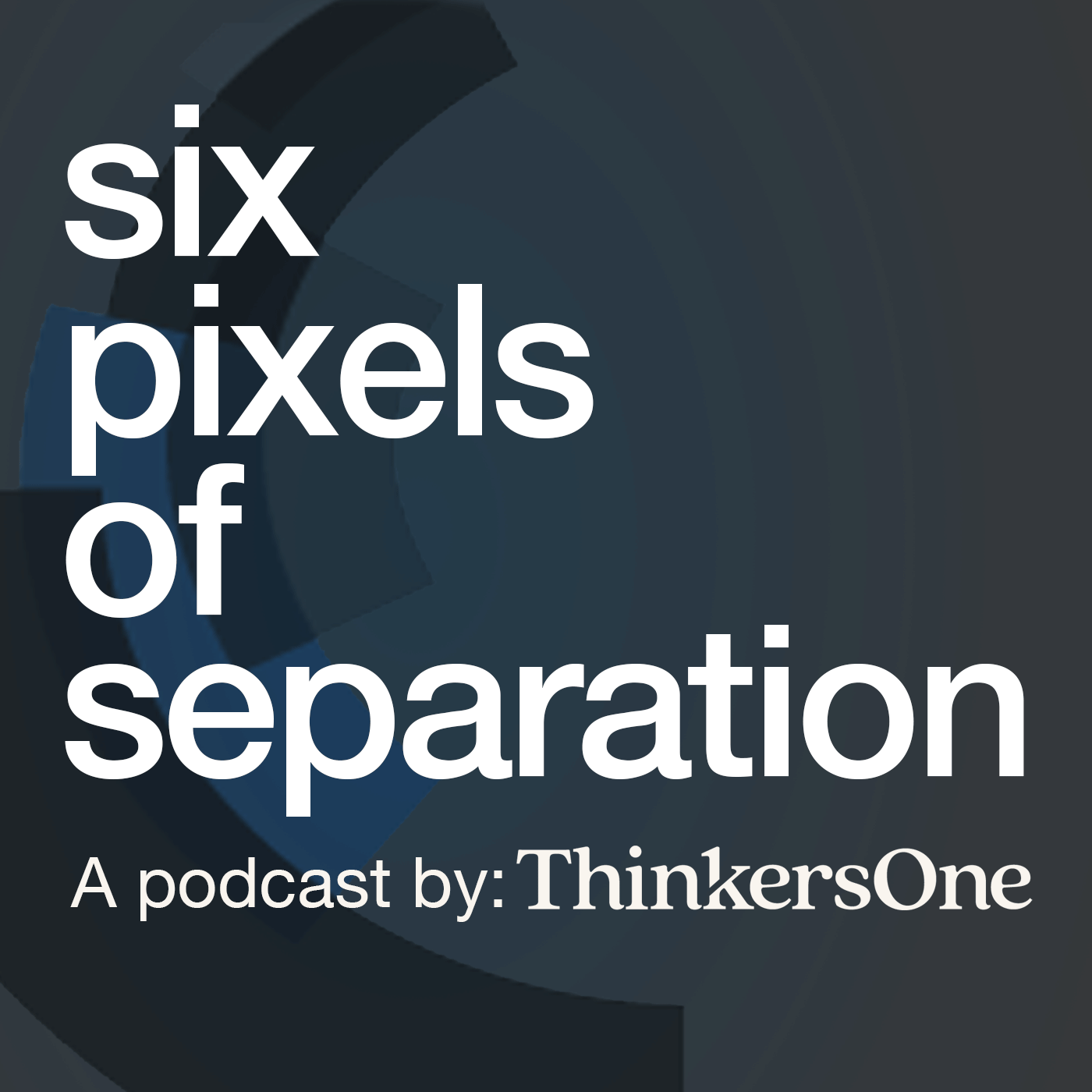Discover Thinking With Mitch Joel
Thinking With Mitch Joel

Thinking With Mitch Joel
Author: Mitch Joel
Subscribed: 2,938Played: 24,417Subscribe
Share
© Copyright 2025
Description
Six Pixels of Separation - Mitch Joel's weekly conversation with business leaders, thinkers, innovators and cultural icons. The show is about insights and provocations on brands, consumers, technology, business and how connected we've all become.
1020 Episodes
Reverse
Welcome to episode #1010 of Thinking With Mitch Joel (formerly Six Pixels of Separation). What if the search for our "true selves" has been leading us away from who we actually need to become? That's the tension at the heart of Dr. Tomas Chamorro-Premuzic's work, a globally respected authority on people analytics, talent, leadership, and the Human–AI interface whose career spans ManpowerGroup, Deeper Signals, Meta Profiling, Columbia University, UCL, and decades of research that have shaped how organizations understand human behavior. His latest book, Don't Be Yourself: Why Authenticity Is Overrated (And What To Do Instead), challenges one of the most cherished modern beliefs - that success comes from projecting our raw, unfiltered selves - and instead argues that adaptability, reputational awareness, and a more evidence-based approach to identity lead to better outcomes for individuals, teams, and societies. He is also the author of Why Do So Many Incompetent Men Become Leaders?, I, Human, The Talent Delusion, and many others. In this conversation, we unpack how hyper-normalized ideas take root, why celebrity culture distorts our sense of what authenticity looks like, and how social media has gamified identity into a curated performance that misleads both the performer and the audience. He explains why leaders must balance sincerity with impression management, how hybrid work and return-to-office debates reveal deeper anxieties about trust and presence, and why intellectual curiosity may be the antidote to polarization in an era where algorithms reward tribalism. The discussion also explores the limits of self-perception, the psychology of reputation, the dangers of treating outliers as role models, and the pivotal role AI may play in counteracting human bias. Ultimately, Tomas argues that authenticity without responsibility collapses into narcissism, and that a more thoughtful, flexible, and socially attuned version of ourselves is not only possible, but necessary. Enjoy the conversation… Running time: 1:06:25. Hello from beautiful Montreal. Listen and subscribe over at Apple Podcasts. Listen and subscribe over at Spotify. Please visit and leave comments on the blog - Thinking With Mitch Joel. Feel free to connect to me directly on LinkedIn. Check out ThinkersOne. Here is my conversation with Dr. Tomas Chamorro-Premuzic. Don't Be Yourself: Why Authenticity Is Overrated (And What To Do Instead. Why Do So Many Incompetent Men Become Leaders?. I, Human. The Talent Delusion. Tomas' other books. Follow Tomas on LinkedIn. Chapters: (00:00) - Introduction to Tomas Chamorro-Premuzic. (03:11) - The Concept of 'Don't Be Yourself'. (06:00) - Hyper Normalization and Management Ideas. (08:48) - The Role of Celebrity and Authenticity. (12:04) - Polarization and Tribalism in Society. (15:11) - The Evolution of Human Interaction. (17:58) - The Impact of AI on Decision Making. (20:49) - Navigating Individualism and Identity. (23:52) - The Dichotomy of Authenticity in Leadership. (26:56) - The Reality of Career Paths and Entrepreneurship. (30:06) - Return to Office and Hybrid Work Dynamics. (33:49) - The Value of 3D Encounters in Recruitment. (36:40) - Authenticity and Skilled Self-Presentation. (39:02) - Collaboration and Trust in Professional Settings. (42:26) - Authenticity vs. Reputation: A Complex Relationship. (48:09) - The Subjectivity of Authenticity. (54:17) - Projecting Positivity in a Negative World. (01:00:10) - Social Media's Impact on Identity and Authenticity.
Welcome to episode #1009 of Thinking With Mitch Joel (formerly Six Pixels of Separation). The future isn't something to predict... it's something to practice. Few people embody that idea more completely than Nick Foster, a designer, futurist and author whose work has quietly influenced some of the most innovative companies on the planet - from Sony, Nokia, and Dyson to Google X, where he served as head of design. In his new book, Could Should Might Don't - How We Think About The Future, Nick challenges the way we imagine what comes next. Rather than offering forecasts, he explores four mindsets - could, should, might, and don't - that shape how individuals and organizations approach uncertainty. In this conversation, Nick reflects on his evolution from industrial design to futures thinking, examining how curiosity fuels creativity, why nostalgia shapes our forward gaze and how responsibility must now sit at the core of every design decision. He questions the seductive influence of science fiction on our collective imagination and unpacks the cultural anxieties that accompany rapid technological change. What emerges is not a roadmap to the future but a framework for thinking. One grounded in humility, storytelling and the courage to sit with what we don't yet know. For Nick, futures design is not about prediction... it's about perspective. Enjoy the conversation… Running time: 1:01:27. Hello from beautiful Montreal. Listen and subscribe over at Apple Podcasts. Listen and subscribe over at Spotify. Please visit and leave comments on the blog - Thinking With Mitch Joel. Feel free to connect to me directly on LinkedIn. Check out ThinkersOne. Here is my conversation with Nick Foster. Could Should Might Don't - How We Think About The Future. Follow Nick on LinkedIn. Chapters: (00:00) - Introduction to Futures Design. (02:55) - Curiosity and Creativity in Design. (06:01) - Exploring the Future: Challenges and Opportunities. (08:58) - The Role of Responsibility in Design. (12:01) - Cultural Shifts and the Future. (14:59) - Navigating the Unknown: The Importance of Questions. (17:49) - The Impact of Nostalgia on Future Thinking. (20:46) - The Role of Science Fiction in Shaping Futures. (24:05) - The Anxiety of Possibility: Handling the 'Might'. (27:10) - The Importance of Humility in Future Predictions. (29:46) - Embracing Uncertainty and Curiosity.
Welcome to episode #1008 of Thinking With Mitch Joel (formerly Six Pixels of Separation). What if artificial intelligence didn't just build faster startups... but redefined what it means to be an entrepreneur? Henrik Werdelin has been exploring that question for years. As the co-founder of Bark (the company behind BarkBox and the new Bark Air) and Prehype (the startup studio that helped launch ventures like AndCo, Ro, and ManagedByQ), Henrik (who also has a great podcast called, Beyond The Prompt) has spent his career creating businesses that live at the intersection of creativity, community and technology. Now, with his new book Me, My Customer And AI, he's rethinking entrepreneurship for a world where anyone can start a business, but few will build one that truly matters. In this conversation, we explore how AI is changing human behavior, the paradox of accessibility and saturation, and why "interestingness" may be the new metric of success. Henrik explains why the future of entrepreneurship isn't about scale, it's about intimacy, authenticity and knowing your customer better than anyone else. We also discuss his latest venture, Audos, a platform designed to help aspiring entrepreneurs build companies using AI agents, and how this movement could usher in a new "neighborhood economy" where small, deeply connected businesses thrive. From reflections on the early internet to insights about the next wave of AI-driven startups, Henrik's ideas are both practical and profoundly human, reminding us that even in an algorithmic age, it's our relationships, our curiosity and our resilience that will define what's next. Enjoy the conversation... Running time: 1:02:18. Hello from beautiful Montreal. Listen and subscribe over at Apple Podcasts. Listen and subscribe over at Spotify. Please visit and leave comments on the blog - Thinking With Mitch Joel. Feel free to connect to me directly on LinkedIn. Check out ThinkersOne. Here is my conversation with Henrik Werdelin. Me, My Customer And AI. Bark. Audos. Prehype. Beyond The Prompt. Follow Henrik on LinkedIn. Chapters: (00:00) - Introduction to Entrepreneurship and AI. (02:10) - Understanding AI's Impact on Human Behavior. (06:42) - The Evolution of AI Tools and Their Implications. (11:54) - Navigating the Future: Utopia vs. Dystopia. (18:46) - The Changing Landscape of Entrepreneurship. (24:20) - The Role of AI in Business Creation. (30:40) - Radical Humanness in the Age of AI. (37:30) - The Future of Capitalism and Entrepreneurship. (46:33) - The Unbundling of SaaS and Content Creation. (55:43) - Pursuing Interestingness in Entrepreneurship.
Welcome to episode #1007 of Thinking With Mitch Joel (formerly Six Pixels of Separation). The debate over hybrid work has become one of the most emotionally charged topics in business... but few people have studied it as deeply as Peter Cappelli, the George W. Taylor Professor of Management at the Wharton School and Director of its Center for Human Resources. In his latest book, In Praise Of The Office - The Limits To Hybrid And Remote Work, co-authored with Ranya Nehmeh, Peter challenges the idea that remote work is the inevitable future of knowledge work. Drawing from decades of research and real-world case studies, he argues that while technology has allowed us to untether from our desks, it has also quietly eroded the social fabric, mentorship and serendipity that make work meaningful, and organizations effective. In this conversation, Peter dives into the paradox of productivity versus connection, exploring why human resources has become more transactional, how AI is reshaping education and engagement, and why hybrid work often brings out the worst of both worlds when poorly managed. He also unpack how the office - once dismissed as a relic of corporate control - remains a critical engine for creativity, trust and long-term career growth. From the psychology of "coffee badging" to the economics of empty buildings, this discussion examines not just where we work, but what we risk losing when we stop showing up. Enjoy the conversation... Running time: 1:04:44. Hello from beautiful Montreal. Listen and subscribe over at Apple Podcasts. Listen and subscribe over at Spotify. Please visit and leave comments on the blog - Thinking With Mitch Joel. Feel free to connect to me directly on LinkedIn. Check out ThinkersOne. Here is my conversation with Peter Cappelli. In Praise Of The Office - The Limits To Hybrid And Remote Work. Ranya Nehmeh. Wharton School. Center for Human Resources. Peter's other books. Follow Peter on LinkedIn. Chapters: (00:00) - Introduction to Peter Capelli and His Work. (00:59) - The Changing Landscape of Business Education. (02:28) - The Impact of AI on Learning and Teaching. (07:02) - The Role of Human Resources in Modern Organizations. (12:04) - In Praise of the Office: A Case for Physical Workspaces. (14:53) - The Political Dynamics of Office Work. (19:55) - The Evolution of Employee Engagement and Company Culture. (24:35) - Debating the Future of Work: Office vs. Remote. (33:58) - The Data Behind Productivity and Employee Well-being. (36:42) - Rebuilding Social Connections in Hybrid Work. (38:47) - The Dilemma of Return to Office Mandates. (40:31) - Management's Role in Organizational Change. (44:39) - The Importance of Anchor Days. (48:37) - Cultural Dynamics in the Workplace. (52:29) - The Challenge of New Hires. (56:25) - The Disconnect in Remote Work Practices.
Welcome to episode #1006 of Thinking With Mitch Joel (formerly Six Pixels of Separation). Disruption isn't always loud. It's often quiet, slow and deeply human. That's one of the lessons Scott Anthony has spent his career unpacking. As a leading voice on innovation and the managing partner emeritus at Innosight (the consultancy founded by the late Clayton Christensen), Scott has helped global companies navigate the uncertainty that comes with change. He si currently a Clinical Professor of Strategy at Dartmouth's Tuck School of Business. His latest book, Epic Disruptions – 11 Innovations That Shaped Our Modern World, reframes how we think about progress through stories that stretch from gunpowder to generative AI, showing that real innovation rarely arrives overnight (he's also written eight other books). It compounds through persistence, vision and luck. In this conversation, we explore what disruption really looks like inside organizations: the emotional toll of change, why mergers and acquisitions often fail, and how the next generation of intrapreneurs can learn from past innovators rather than repeat their mistakes. We also talk about the future of business education and how AI is rewriting the way we learn, teach, and measure knowledge (and why the classic case study model still has a role to play if it evolves with the times). Scott's perspective is grounded in humility and curiosity, shaped by years of studying leaders who dared to think differently and systems that resisted transformation. Whether you're navigating the next big pivot, building within a legacy organization, or simply trying to understand how the forces of innovation ripple through industries, this conversation offers a rare mix of strategy and soul. It's not about predicting the next big thing, it's about learning to see the patterns in change itself. Enjoy the conversation… Running time: 54:55. Hello from beautiful Montreal. Listen and subscribe over at Apple Podcasts. Listen and subscribe over at Spotify. Please visit and leave comments on the blog - Thinking With Mitch Joel. Feel free to connect to me directly on LinkedIn. Check out ThinkersOne. Here is my conversation with Scott Anthony. Disruptions – 11 Innovations That Shaped Our Modern World. Scott's other books on innovation and strategy. Dartmouth's Tuck School of Business. Follow Scott on LinkedIn. Chapters: (00:00) - Introduction to Disruptive Change. (05:03) - Navigating the Use of AI in Learning. (09:32) - The Language of Collaboration with Technology. (10:32) - Reflections on Clayton Christensen's Influence. (14:19) - The Role of Case Studies in Business Education. (18:21) - Understanding Failure in Business Contexts. (20:44) - The Complexities of Mergers and Acquisitions. (23:02) - The Challenges of Change Management. (25:21) - The Future of Work and Collaboration. (27:16) - Defining Disruption and Collaboration. (28:04) - Epic Disruptions: The Selection Process. (29:24) - The Stories Behind Disruptions. (31:01) - Lessons from Julia Child and Disruption. (34:05) - Understanding Stasis in Business. (38:37) - Why Great Companies Fail. (41:20) - The Role of Incumbents in Innovation. (43:18) - The Emergence of Intrapreneurs. (45:12) - Navigating the Great Unfreezing. (47:36) - The Long Game of Technology Adoption. (49:04) - The Four Questions of Disruption.
Welcome to episode #1005 of Thinking With Mitch Joel (formerly Six Pixels of Separation). Every major leap in human connection starts as a simple question: what if? For Rouzbeh Yassini-Fard, that question led to the invention of the cable modem and the birth of broadband internet access as we know it. Often called the "father of the cable modem," Rouzbeh is a visionary engineer and entrepreneur whose work transformed how billions of people access information. His new book, The Accidental Network, traces the improbable journey from an idea nobody believed in ("why would anyone want the internet at home?") to the global infrastructure that now powers our economy, culture and daily life. In this conversation, he reflects on the messy, human side of innovation: the skeptics who dismissed broadband, the long nights building hardware that few thought possible, and the radical choice to make his breakthrough technology open-standard so the world could share it. Rouzbeh speaks with humility about how chance, persistence and purpose collided to shape the digital age, and how broadband became not just a business revolution but a social one, connecting homes, hospitals, schools and communities. He also wrestles with the moral dimension of progress, calling for a balance between capitalism and conscience as we enter an era defined by AI, environmental strain and "data as the new oil." From the early chaos of coaxial cables to the moral complexity of modern networks, Rouzbeh's story is a reminder that technology's true purpose isn't speed or profit... it's improving the quality of life for everyone it touches. Enjoy the conversation… Running time: 1:00:46. Hello from beautiful Montreal. Listen and subscribe over at Apple Podcasts. Listen and subscribe over at Spotify. Please visit and leave comments on the blog - Thinking With Mitch Joel. Feel free to connect to me directly on LinkedIn. Check out ThinkersOne. Here is my conversation with Rouzbeh Yassini-Fard. The Accidental Network. Follow Rouzbeh on LinkedIn. Chapters: (00:00) - The Accidental Network: Origins and Vision. (06:00) - The Entrepreneurial Journey: Overcoming Naysayers. (12:07) - From Business Applications to Consumer Connectivity. (17:51) - The Open Standard Gamble: A Strategic Choice. (23:45) - Navigating the Dot Com Boom and Bust. (30:08) - The Rise of Broadband: Transforming the Cable Industry. (30:35) - The Journey of an Entrepreneur. (32:01) - Scaling and Selling the Company. (33:27) - Contributions to the Cable Industry. (36:11) - Philosophy of Innovation and Humanity. (39:11) - Data as a New Resource. (42:13) - Access as a Human Right. (43:26) - The Last Mile Challenge. (46:36) - Future of Connectivity. (50:02) - Centralized vs. Decentralized Networks. (54:07) - Environmental Considerations in Technology. (56:15) - Reflections on a Successful Career.
Welcome to episode #1004 of Thinking With Mitch Joel (formerly Six Pixels of Separation). What does it really mean to lead with values when so much of modern business seems built on quarterly results and surface-level culture? Robert Glazer has spent his career proving that sustainable performance isn't just about financial results. It's about the alignment between who you are and what you stand for. As founder and chairman of Acceleration Partners (a marketing agency), Bob built a company repeatedly recognized as one of the best places to work. Beyond the accolades, he is an author of seven books, including Elevate, Elevate Your Team and his latest, The Compass Within: A Little Story About the Values That Guide Us. In this conversation, Bob explores the central role that core values play in authentic leadership, how formative experiences shape decision-making and why self-awareness is the foundation of both personal and organizational growth. He explains how parables and storytelling can make complex business ideas more memorable, why mentorship still matters in a polarized and tech-driven world and how the rise of AI is intersecting with deeply human questions about meaning, integrity and belief. Bob reminds us that values are not slogans for walls or websites but active forces that define culture, guide behavior and ultimately determine whether leaders and organizations thrive or falter. In an era where data can overwhelm judgment and polarization can fracture trust, his work pushes us to examine whether our actions reflect the values we claim to hold, and how to close that gap. Enjoy the conversation… Running time: 57:33. Hello from beautiful Montreal. Listen and subscribe over at Apple Podcasts. Listen and subscribe over at Spotify. Please visit and leave comments on the blog - Thinking With Mitch Joel. Feel free to connect to me directly on LinkedIn. Check out ThinkersOne. Here is my conversation with Robert Glazer. The Compass Within: A Little Story About the Values That Guide Us. Elevate. Elevate Your Team. Get Bob's newsletter, Friday Forward. The Elevate Podcast. Follow Robert on Instagram. Follow Robert on LinkedIn. Chapters: (00:00) - Introduction to Core Values and Leadership. (03:00) - The Power of Parables in Business. (06:01) - Understanding Personal Core Values. (09:06) - The Intersection of Values and Leadership. (11:50) - Authenticity and the Authentic Self. (14:45) - Navigating Values in a Polarized World. (18:00) - The Role of Values in Business Decisions. (20:57) - The Challenge of Aligning Personal and Company Values. (23:50) - Embracing Values in a Complex World. (31:10) - Authenticity in Business Decisions. (33:58) - The Cost of Upholding Values. (35:23) - Core Values and Decision Making. (39:24) - The Evolution of Relationships. (41:31) - Character Development in Storytelling. (44:04) - The Role of Mentorship. (48:12) - AI as a Thought Partner. (53:46) - Cognitive Dissonance and Values.
Welcome to episode #1003 of Thinking With Mitch Joel (formerly Six Pixels of Separation). When you look closely at leadership, it often seems like a conversation about others… how to motivate, how to manage, how to inspire. But what if the real work starts somewhere far more intimate… with yourself? Margaret Andrews, a distinguished educator, consultant and leadership expert, has spent years making the case that true leadership begins with self-awareness. It's the quiet realization that the patterns of your past, your assumptions and your worldview don't just shape who you are… they shape how you lead. Margaret's career has taken her from executive roles at institutions like MIT and Harvard to the classroom, where her popular course Managing Yourself And Leading Others has drawn thousands of leaders seeking to better understand their own strengths and blind spots. This journey culminated in her new book, Manage Yourself To Lead Others - Why Great Leadership Begins With Self-Understanding, which distills years of teaching and research into practical frameworks for leaders who want to navigate complexity without losing sight of their humanity. In this conversation, Margaret pushes us to rethink the building blocks of effective leadership: feedback as a gift (even when it stings), authenticity as resilience and adaptability as a modern necessity in a world where AI and technology are rewriting the rules of management. We also explore how success is deeply personal (not a one-size-fits-all construct handed down by society) and something each leader must define for themselves. Margaret's perspective resonates because it is both pragmatic and deeply human. She doesn't shy away from the messy truth that leadership is often uncomfortable, but she also insists that discomfort is where growth lives. By weaving together scholarship, personal experience and insights from her work with executives around the globe, Margaret makes a compelling case for leadership as an ongoing journey of self-discovery. For anyone looking to evolve not just as a professional but as a whole person navigating a rapidly changing world, her work is a beacon. Enjoy the conversation... Running time: 1:03:08. Hello from beautiful Montreal. Listen and subscribe over at Apple Podcasts. Listen and subscribe over at Spotify. Please visit and leave comments on the blog - Thinking With Mitch Joel. Feel free to connect to me directly on LinkedIn. Check out ThinkersOne. Here is my conversation with Margaret Andrews,. Manage Yourself To Lead Others - Why Great Leadership Begins With Self-Understanding. Her course: Managing Yourself And Leading Others. Follow Margaret on LinkedIn. Chapters: (00:00) - Introduction to Leadership and Self-Management. (05:55) - The Role of Feedback in Leadership. (12:01) - The Impact of AI on Interpersonal Communication. (17:55) - The Challenges of Self-Selection in Careers. (23:54) - The Evolution of Job Tenure and Leadership Dynamics. (32:35) - Navigating Leadership Challenges in a Public World. (39:51) - Understanding Leadership Styles and Personal Evolution. (45:26) - The Changing Perception of Leadership in Society. (53:13) - Balancing Fast-Moving Environments with Reflective Practices. (01:02:23) - Parenting Lessons Applied to Leadership.
Welcome to episode #1002 of Thinking With Mitch Joel (formerly Six Pixels of Separation). What if code isn't just software, but the culture script of our age shaping what we notice, how we decide and who holds power? That's the provocation at the heart of Sam Arbesman's new book, The Magic Of Code - How Digital Language Created And Connects Our World - And Shapes Our Future, which he uses to reveal how programming moves from the screen into the fabric of everyday life. Sam is Scientist in Residence at Lux Capital and a visiting scholar at Harvard. He connects emerging technologies with human systems and helps founders, leaders and the rest of us make sense of complexity. He is also the author of two other influential books (The Half-Life of Facts and Overcomplicated). In this episode, we get a plain-English tour of why coding now functions as cultural literacy, why "vibe coding" and natural-language tools lower barriers without removing responsibility, and how to think clearly about the trade-offs when AI accelerates creation but also amplifies hidden assumptions. Sam breaks down how to treat algorithms less like oracles and more like instruments, demystifying engagement mechanics on social platforms, highlighting the shrinking shelf life of facts and offering ways to keep agency when tools get smarter and more opaque. These are practical frames for navigating complex systems (and their failure modes), along with a humane case for humility in product and policy and a reminder that the goal isn't more tech for its own sake, but better versions of ourselves using it. If you care about where code, culture and creativity meet… and how to keep your bearings as the ground shifts… this one delivers both the big picture and next steps for smarter, more intentional use of the tools we're all inheriting. Enjoy the conversation... Running time: 56:47. Hello from beautiful Montreal. Listen and subscribe over at Apple Podcasts. Listen and subscribe over at Spotify. Please visit and leave comments on the blog - Thinking With Mitch Joel. Feel free to connect to me directly on LinkedIn. Check out ThinkersOne. Here is my conversation with Sam Arbesman. The Magic Of Code - How Digital Language Created And Connects Our World - And Shapes Our Future. The Half-Life of Facts. Overcomplicated. Lux Capital. Sign up for Sam's newsletter. Follow Sam on LinkedIn. Chapters: (00:00) - Exploring the Role of a Scientist in Residence. (03:08) - The Evolution of Knowledge and Information. (05:50) - The Importance of Coding in Modern Society. (08:54) - Demystifying Coding and Access to Technology. (12:11) - Cultural Shifts in Technology Perception. (15:08) - Understanding the Complexity of Code. (17:58) - Code as the Grammar of Modern Civilization. (20:48) - The Impact of Code on Society. (24:08) - The Future of AI and Coding. (32:58) - The Evolution of Programming. (36:14) - Vibe Coding: The Future of Software Development. (39:44) - Democratizing Software: Customization for Everyone. (43:09) - The Complexity of Technology and Trust. (48:28) - Understanding Complex Systems. (51:58) - Human Limitations in Technology. (54:09) - The Role of Technology in Shaping Humanity.
Welcome to episode #1001 of Thinking With Mitch Joel (formerly Six Pixels of Separation). Toby Stuart is a Distinguished Professor of Business Administration at the Haas School of Business, UC Berkeley, where he directs the Berkeley-Haas Entrepreneurship Program and the Institute for Business Innovation. Over his career, he has also taught at Harvard, Columbia, Chicago Booth and MIT Sloan, and he is recognized globally as one of the leading thinkers on entrepreneurship, networks and organizational strategy. Beyond academia, Toby sits on the boards of multiple technology companies, cofounded the Black Venture Institute, and serves as the founding Chairman of Workday's AI Advisory Board. His latest book, Anointed - The Extraordinary Effects Of Social Status In A Winner-Take-Most World, examines the invisible hierarchies that govern so much of human life and why small advantages so often compound into massive outcomes. From why blurbs on books sway readers, to how neighborhoods or technologies become "the next big thing," to the inequalities embedded in who gets credit for innovation, Anointed reveals how status shapes trust, opportunity and even our sense of self (I loved this book). Toby argues that status is both necessary - helping us navigate infinite choices in the modern world - and corrosive, creating inequality that is often disconnected from true merit. In our discussion, Toby unpacks the mechanics of anointment, the ways status rubs off through association and how technology, especially AI, might both entrench and disrupt these hierarchies. The conversation explores the paradox of meritocracy, the illusions of self-anointment in today's digital culture and the future of work as AI accelerates change. If you've ever wondered why some ideas, people, or companies get chosen while others languish (or even how you go to where you are), this conversation will challenge you to see the hidden operating system behind everyday decisions. Enjoy the conversation... Running time: 55:24. Hello from beautiful Montreal. Listen and subscribe over at Apple Podcasts. Listen and subscribe over at Spotify. Please visit and leave comments on the blog - Thinking With Mitch Joel. Feel free to connect to me directly on LinkedIn. Check out ThinkersOne. Here is my conversation with Toby Stuart. Anointed - The Extraordinary Effects Of Social Status In A Winner-Take-Most World. Haas School of Business. Follow Toby on LinkedIn. Chapters: (00:00) - Introduction to Toby Stuart. (01:50) - Understanding Anointed and Social Status. (04:40) - The Necessity and Corrosiveness of Status. (08:54) - Blurbs, Status, and the Publishing Industry. (12:40) - The Role of Association in Anointment. (15:29) - Breaking into New Fields and Status Transfer. (19:44) - Meritocracy and the Role of AI. (27:12) - AI's Impact on Status and Society. (31:38) - The Impact of AI on Status and Credentials. (34:46) - Evaluating Human Contribution in the Age of AI. (39:17) - The Future of AI Regulation and Power Dynamics. (45:29) - Self-Anointed Status in a Digital World. (51:25) - Reflections on Status and Personal Growth.
Welcome to episode #1000 of Six Pixels of Separation - The ThinkersOne Podcast. Patrick Tanguay is a self-described generalist, synthesist and curator whose lifelong curiosity and love of reading have led him across multiple careers, and now shape one of the most thoughtful newsletters in the futures-thinking space. As the creator of Sentiers, a weekly "futures thinking observatory" (and one of my most favorite reads), Patrick spotlights signals of change across technology, society, and culture. He helps readers trace emergent paths instead of prescribing them. Alongside his writing, he designed and launched Station C, one of the first co-working spaces, co-founded the print magazine, The Alpine Review, and seeded communities like Creative Mornings and some of the earlier community get-togethers for the digital enthusiasts. For episode #1000, Patrick guides us through how he curates global currents of change, explores how platform design, sense-making systems and personal knowledge management influence our capacity to understand the future, and why the skills of generalists matter now more than ever. He walks us through why Sentiers became such a respected newsletter and how its architecture reinforces and expands his handwritten trail of ideas. Across the show we consider how to build a personal "observatory," not just follow feed algorithms, how to connect seemingly disparate signals from AI to city futures, and why being able to notice what's happening before everyone else is becoming more crucial... and more rare. This is an episode for curious minds, digital gardeners and anyone searching for clarity amid chaos. I hope that you will also take a couple of moments to listen to my opening monologue about my reflections on the past 1000 episodes (nearly 20 years), and what the future will hold for this show starting next week. Enjoy the conversation… Running time: 1:28:08. Hello from beautiful Montreal. Listen and subscribe over at Apple Podcasts. Listen and subscribe over at Spotify. Please visit and leave comments on the blog - Six Pixels of Separation. Feel free to connect to me directly on Facebook here: Mitch Joel on Facebook. Check out ThinkersOne. or you can connect on LinkedIn. ...or on X. Here is my conversation with Patrick Tanguay. Sentiers. The Alpine Review. Follow Patrick on LinkedIn. Chapters: (00:00) - The Evolution of Six Pixels of Separation. (04:14) - Introducing Patrick Tanguay. (05:31) - The Art of Thinking and Curating. (20:56) - Foresight and Future Thinking. (29:54) - Navigating the World of AI. (41:41) - The Role of Reading in Deep Thinking. (01:00:08) - The Future of Knowledge Work. (01:10:04) - The Intersection of AI and Human Purpose.
Welcome to episode #999 of Six Pixels of Separation - The ThinkersOne Podcast. Noah Giansiracusa is an associate professor of mathematics at Bentley University and a visiting scholar at Harvard who has built a reputation for translating the hidden power of algorithms into plain language that empowers individuals. With a PhD in algebraic geometry from Brown, he's always bringing a mathematician's eye to the cultural and social impact of technology. His earlier book, How Algorithms Create and Prevent Fake News, was praised by Nobel Prize–winning economist Paul Romer as "the best guide to the strategies and stakes of this battle for the future." In his latest book, Robin Hood Math - Take Control Of The Algorithms That Run Your Life, Noah shows how banks, insurers, tech giants and governments use algorithms to make decisions that shape our lives, and how ordinary people can reclaim agency using simple mathematical tools. At a time when our feeds, finances and even friendships are increasingly mediated by code, Noah argues that math can be a democratizing force: a way to cut through the opacity of "black box" systems, understand who benefits from them, and make better choices in daily life. His work emphasizes that algorithms are neither inherently good nor bad, they tilt the balance of power depending on who wields them. By unpacking formulas like the weighted sum that underpins credit scores, college rankings and even TikTok virality, he provides a way to see through the manipulation and complexity. In this episode, Noah discusses the double-edged nature of technology, the transparency gap in digital platforms, the cultural consequences of algorithm-driven media and why math education must evolve to reflect the algorithmic realities students are already living. For anyone curious about reclaiming autonomy in a world increasingly designed by machines, his message is clear: a little math can go a long way in leveling the playing field. Enjoy the conversation... Running time: 1:05:57. Hello from beautiful Montreal. Listen and subscribe over at Apple Podcasts. Listen and subscribe over at Spotify. Please visit and leave comments on the blog - Six Pixels of Separation. Feel free to connect to me directly on Facebook here: Mitch Joel on Facebook. Check out ThinkersOne. or you can connect on LinkedIn. ...or on X. Here is my conversation with Noah Giansiracusa. Robin Hood Math - Take Control Of The Algorithms That Run Your Life. How Algorithms Create and Prevent Fake News. Check out Noah's podcast: AI In Academia: Navigating The Future. Follow Noah on Instagram. Follow Noah on LinkedIn. Chapters: (00:00) - Understanding Algorithms and Their Impact. (03:11) - The Dual Nature of Technology. (06:05) - Agency in an Algorithmic World. (09:00) - The Centralization of Algorithms. (11:53) - The Role of Math in Understanding Algorithms. (15:04) - Practical Applications of Algorithm Understanding. (19:07) - Engagement and Its Consequences. (24:06) - Navigating Social Media Dynamics. (27:54) - The Future of AI and Algorithms. (37:28) - Understanding AI: Generative vs Traditional. (39:59) - The Impact of AI on Social Media. (41:25) - Data as the New Oil: Advertising and Efficacy. (44:51) - Transparency in Technology and Advertising. (48:19) - Bridging the Gap: Understanding Algorithms. (51:56) - The Power Dynamics of Technology. (53:58) - Reclaiming Agency Through Math. (56:49) - Rethinking Math Education for the Modern World. (01:00:42) - Simplicity in Complexity: Understanding Algorithms. (01:03:51) - Finding Relevance in Math.
Welcome to episode #998 of Six Pixels of Separation - The ThinkersOne Podcast. Annie Wilson is a marketing professor at the Wharton School of the University of Pennsylvania and co-author, with Ryan Hamilton, of The Growth Dilemma - Managing Your Brand When Different Customers Want Different Things. Her work examines the deep interplay between consumer behavior, culture and brand identity, helping leaders understand why growth often creates as many risks as it does opportunities. In The Growth Dilemma, Annie unpacks how efforts to reach new customer segments can clash with the values of loyal buyers, sometimes threatening the very meaning of a brand. Drawing from real-world examples (from Apple's software missteps to Gucci's unintended association with reality TV fame) she reveals how scarcity, exclusivity and cultural perception shape brand power in ways most executives overlook. Beyond brand strategy, Annie's research and teaching explore the ways marketing has evolved as a discipline, especially in an era of AI, fragmented media and globalization. She highlights how authenticity, community and cultural nuance are becoming non-negotiable for sustainable success, and why short-termism remains one of the most dangerous traps for modern marketers. For those navigating the intersection of consumer connection and cultural influence, Annie offers a critical lens on how to balance growth with integrity, how to adapt without betraying your core identity and how to see branding not just as a commercial practice, but as a cultural one. This conversation is essential listening for anyone grappling with the future of marketing in an age of shifting consumer expectations, technological disruption and global homogenization. Enjoy the conversation... Running time: 1:01:53. Hello from beautiful Montreal. Listen and subscribe over at Apple Podcasts. Listen and subscribe over at Spotify. Please visit and leave comments on the blog - Six Pixels of Separation. Feel free to connect to me directly on Facebook here: Mitch Joel on Facebook. Check out ThinkersOne. or you can connect on LinkedIn. ...or on X. Here is my conversation with Annie Wilson. The Growth Dilemma - Managing Your Brand When Different Customers Want Different Things. Follow Annie on LinkedIn. Chapters: (00:00) - The Changing Landscape of Marketing. (02:56) - AI's Role in Marketing Education. (05:49) - The Evolving Perception of Marketing as a Career. (09:13) - Advertising in a Fragmented Media World. (12:07) - Branding in a Personalized Market. (14:59) - The Growth Dilemma: Balancing Consumerism and Sustainability. (33:01) - Cultural Influence Over Brand Identity. (35:53) - The Balance of Growth and Authenticity. (39:01) - The Evolution of Consumer Connection. (41:47) - Navigating Brand Growth and Consumer Expectations. (47:07) - Short-Termism in Marketing Strategies. (51:58) - Scarcity and Exclusivity in Brand Strategy. (55:52) - Consumer Perception and Brand Influence.
Welcome to episode #997 of Six Pixels of Separation - The ThinkersOne Podcast. What happens when nearly everything a marketer or strategist does today becomes instant, automatic… and nearly free? That's the premise of AI First, the new book from Adam Brotman (my guest this week) and his co-author Andy Sack, which confronts the existential shift that AI is bringing to brand strategy, customer experience and creative work. Adam, the former Chief Digital Officer at Starbucks and co-founder of the strategic consultancy Forum3, brings firsthand experience building digital platforms that changed how global businesses operate. In this episode, we dive into what it really means to become an "AI First" organization, not just layering on tools, but redesigning your business from the ground up. You'll hear why OpenAI's Sam Altman believes 95% of current marketing agency work will be handled by AI, and what that means for leaders, teams and the future of creative differentiation. We explore the difference between being AI-aware and AI-native, how to run internal pilots that create momentum, and what the future holds for customer loyalty and personalization in a post-human-first creative landscape. For anyone wondering what practical transformation looks like in an AI-saturated world and how to build companies that still feel human, this conversation maps the next five years and beyond. Enjoy the conversation… Running time: 52:22. Hello from beautiful Montreal. Listen and subscribe over at Apple Podcasts. Listen and subscribe over at Spotify. Please visit and leave comments on the blog - Six Pixels of Separation. Feel free to connect to me directly on Facebook here: Mitch Joel on Facebook. Check out ThinkersOne. or you can connect on LinkedIn. ...or on X. Here is my conversation with Adam Brotman. AI First. Forum3. Check out his podcast. Follow Adam on LinkedIn. Chapters: (00:00) - The Journey of Digital Transformation. (05:05) - AI First: Understanding the New Paradigm. (10:00) - The Role of AI in Business Strategy. (15:09) - Navigating the Future of Work with AI. (19:50) - The Promise and Challenges of AGI. (31:58) - The Rise of AI and Human Collaboration. (34:07) - Navigating the AI Landscape: Challenges and Opportunities. (37:27) - Intelligence vs. Imitation: Understanding AI's Capabilities. (40:57) - Creativity in the Age of AI: A New Frontier. (43:30) - The Role of Empathy in AI Interactions. (46:41) - Paradigm Shifts: Embracing Change in Technology. (49:01) - Responsible AI: Balancing Innovation and Ethics. (52:44) - The Future of Work: Adapting to AI Transformations.
Welcome to episode #996 of Six Pixels of Separation - The ThinkersOne Podcast. Christie Smith is a former senior executive at Apple, Deloitte and Accenture with over three decades of leadership experience across industries including life sciences, consumer goods and finance. She holds a doctorate in Social Work and Organizational Psychology and now leads The Humanity Studio, a leadership advisory firm focused on redefining the future of work. In her new book, Essential - How Distributed Teams, Generative AI, and Global Shifts Are Creating a New Human-Powered Leadership (along with her co-author Kelly Monahan), Christie outlines a bold new framework for leaders navigating a post-pandemic, AI-driven, decentralized world. This episode explores the urgent need for management transformation - from command-and-control to people-centered leadership - and how today's leaders must adapt to rising expectations around purpose, trust and equity. Topics include the power shift from corporations to individuals, the cultural cost of distributed work, and why organizations must stop measuring productivity and start cultivating human energy. The discussion also unpacks the psychological strain of "always-on" work cultures, the promise and peril of generative AI, and how leaders can build communities, not just companies. At its core, this conversation is about what comes after burnout… what it means to lead with humanity, design systems that elevate people, and use power responsibly in a time of profound disruption. For anyone rethinking what it means to lead, build and belong in the modern workplace, this episode offers a timely and hopeful reframing of what's possible. Enjoy the conversation... Running time: 56:23. Hello from beautiful Montreal. Listen and subscribe over at Apple Podcasts. Listen and subscribe over at Spotify. Please visit and leave comments on the blog - Six Pixels of Separation. Feel free to connect to me directly on Facebook here: Mitch Joel on Facebook. Check out ThinkersOne. or you can connect on LinkedIn. ...or on X. Here is my conversation with Christie Smith. Essential - How Distributed Teams, Generative AI, and Global Shifts Are Creating a New Human-Powered Leadership. The Humanity Studio. Follow Christie on Instagram. Follow Christie on LinkedIn. Chapters: (00:00) - The Evolving Role of Leadership. (03:06) - Emotional Maturity in Leadership. (05:51) - The Impact of the Pandemic on Leadership. (08:55) - Employee Expectations and Organizational Change. (11:54) - The Shift Towards Purpose-Driven Leadership. (15:05) - Navigating Challenges in Large Organizations. (18:11) - The Rise of Entrepreneurship and New Work Models. (21:03) - Community and Connection in the Digital Age. (33:24) - The Human Element in AI and Workplaces. (39:10) - Agency and Connection in Leadership. (45:51) - Legacy and Leadership in a Changing World. (52:10) - Building a New Organization: Culture and Purpose. (58:28) - Curiosity and Hope in the Face of Challenges.
Welcome to episode #995 of Six Pixels of Separation - The ThinkersOne Podcast. Nelson Repenning has built his career at MIT Sloan and Shift Gear by asking a simple but haunting question: why do so many smart, capable organizations fail to get the right work done? In his new book, There's Got to Be a Better Way, Nelson (along with his co-author, Don Kieffer) introduces dynamic work design: a practical framework that helps leaders move beyond broken systems and toward better execution. In this conversation, we explore the five principles behind this approach: solving the right problem, structuring for discovery, connecting the human chain, regulating for flow and visualizing the work. We talk about how businesses become addicted to heroics and strategic ambiguity, and how this culture often traps people in cycles of fire-fighting and busywork that look productive but deliver little. Nelson shares stories from his experience applying these principles in casinos, hospitals, biotech labs, and even homeless shelters (environments where urgency is real, resources are stretched and clarity can make or break outcomes). We also discuss how leadership often overcomplicates productivity with reorgs and top-down mandates, instead of fixing the structural design flaws that block meaningful progress. Nelson is quick to point out that the work isn't just about doing more: it's about doing it better… and that better means aligning actual workflow with the outcomes organizations care about. He reflects on his early days as a student at MIT and why dynamic work design is less a management fad and more a necessary shift in how modern teams operate. If you're tired of watching your best people get burned out chasing KPIs while nothing fundamental improves, this episode offers a clearer path. We also get into the tension between change management and change design, and why the latter matters more in a world flooded with noise, complexity and well-intentioned but ineffective solutions. This is a sharp and focused take on work culture from someone who's spent a lifetime challenging the systems beneath it. Enjoy the conversation… Running time: 1:00:22. Hello from beautiful Montreal. Listen and subscribe over at Apple Podcasts. Listen and subscribe over at Spotify. Please visit and leave comments on the blog - Six Pixels of Separation. Feel free to connect to me directly on Facebook here: Mitch Joel on Facebook. Check out ThinkersOne. or you can connect on LinkedIn. ...or on X. Here is my conversation with Nelson Repenning. There's Got to Be a Better Way. Shift Gear. MIT Sloan. Follow Nelson on LinkedIn. Chapters: (00:00) - Introduction to Nelson Repenning. (02:55) - The Journey to System Dynamics. (05:55) - Bridging Theory and Practice in Organizations. (09:14) - The Challenge of Success and Anomalies. (11:54) - Dynamic Work Design: From Manufacturing to Knowledge Work. (15:06) - The Role of AI in Knowledge Work. (18:12) - Manufacturing's Future and National Security. (20:58) - The Integration of Design and Manufacturing. (32:01) - The Complexity of Manufacturing and Supply Chains. (33:14) - Dynamic Work Design: A New Approach. (35:34) - Identifying and Solving the Right Problems. (39:28) - The Disconnect Between Management and Ground Realities. (42:14) - Adapting Management Practices for Hybrid Work. (45:33) - Visual Management in Knowledge Work. (52:44) - Regulating Flow to Prevent Overload. (58:41) - The Psychological Hurdles of Change.
Welcome to episode #994 of Six Pixels of Separation - The ThinkersOne Podcast. Vicki Tan has designed experiences for some of the most influential companies in the world (Pinterest, Airbnb, Headspace, Lyft, Google) and her work has always focused on helping people make better choices in complex environments. Her new book, Ask This Book A Question, continues that mission in a radically creative form. This isn't your typical self-help guide. It's an interactive journey through the beautiful mess of human decision-making, shaped by the science of cognitive bias, the power of storytelling and the playfulness of visual design. Vicki explores how our mental shortcuts shape everything - from whether we leave our job to how we fall in love - and how reframing our questions can unlock more clarity than any answer ever could. She talks about the tension between intuition and logic, the real-world costs of not understanding our own biases and the way interface design and behavior design intersect in both delightful and dangerous ways. In this epsiode, she also digs into the deeper story behind the book: How she collaborated with artists to visualize psychological concepts and why she believes our decisions deserve more compassion than critique. This episode is for anyone who's ever overthought a text message… or stood paralyzed in a grocery aisle… or wondered why being human feels so confusing sometimes. Which is to say: it's for all of us. Enjoy the conversation… Running time: 54:55. Hello from beautiful Montreal. Listen and subscribe over at Apple Podcasts. Listen and subscribe over at Spotify. Please visit and leave comments on the blog - Six Pixels of Separation. Feel free to connect to me directly on Facebook here: Mitch Joel on Facebook. Check out ThinkersOne. or you can connect on LinkedIn. ...or on X. Here is my conversation with Vicki Tan. Ask This Book A Question. Follow Vicki on Instagram. Follow Vicki on LinkedIn. Chapters: (00:00) - Introduction to Vicki Tan and Her Journey. (02:57) - Balancing Work and Writing. (05:55) - Understanding Product Design. (08:56) - The Role of Luck in Career Success. (12:00) - The Importance of Asking Questions. (15:01) - The Process of Writing a Book. (17:49) - Cognitive Biases and Decision Making. (20:52) - Cultural Perspectives on Risk. (24:10) - Engaging with the Book and Its Purpose. (28:23) - The Polarization of Society and Technology's Role. (29:16) - The Evolution of Music Consumption and Its Implications. (32:16) - Designing for the Future: The Role of Creators. (37:25) - Risk Tolerance and the Art of Quitting. (41:41) - Navigating Decision Fatigue in a Complex World. (46:08) - The Impact of AI on Decision Making. (52:20) - Understanding Time and Decision Making in a Vortex of Choices.
Welcome to episode #993 of Six Pixels of Separation - The ThinkersOne Podcast. Angela Chee is a keynote speaker, media and communication coach, and author of The Power Of the Only – Own Your Voice, Thrive in Any Environment, a book that challenges us to rethink the spaces we occupy and the voices we often silence… especially our own. In this conversation, Angela explores what it means to truly "own your voice" in an era defined by visibility and vulnerability, noise and nuance. Angela speaks candidly about how being the "only" in the room (whether because of race, gender, background, or perspective) is not a disadvantage but a profound source of power and insight. We discuss the emotional tension of the spotlight effect, where the desire to be seen and the fear of judgment collide, and how discernment (not just visibility) becomes the essential skill for modern communication. Angela opens up about the importance of balancing authenticity with intention, and why the journey of discovering your voice is never really over. It's a practice, a reclaiming and a reshaping of self in response to a constantly shifting cultural landscape. We touch on the rise of AI, the tension of audience capture, the commodification of personality, and the difference between performance and presence. Angela's perspective is grounded in clarity and connection, and she brings both wisdom and structure to the chaos of today's media environment. Her Five Principles of The Power of the Only are not just a framework for communication, they're a roadmap for identity and leadership in uncertain times. This conversation is for anyone feeling overwhelmed by the demand to "show up" in public, who wonders if they're saying too much or not enough, or who is searching for the courage to take up space without apology. If you've ever felt like an outsider at work, in life, or even in your own skin, this episode reminds us that our difference isn't something to overcome. It's the very thing that makes us whole. Enjoy the conversation… Running time: 58:53. Hello from beautiful Montreal. Listen and subscribe over at Apple Podcasts. Listen and subscribe over at Spotify. Please visit and leave comments on the blog - Six Pixels of Separation. Feel free to connect to me directly on Facebook here: Mitch Joel on Facebook. Check out ThinkersOne. or you can connect on LinkedIn. ...or on X. Here is my conversation with Angela Chee. The Power Of the Only – Own Your Voice, Thrive in Any Environment. Follow Angela on Instagram. Follow Angela on LinkedIn. Book Angela for your next meeting on ThinkersOne. Chapters: (00:00) - The Power of Communication and Visibility. (03:09) - Navigating the Spotlight Effect. (06:03) - Owning Your Voice and Power. (08:53) - The Evolution of Personal Branding. (11:52) - Balancing Authenticity and Marketing. (15:11) - The Challenge of Expertise vs. Ego. (17:53) - Media Literacy and Cultural Change. (29:34) - The Shift from Value to Volume. (32:15) - Navigating Audience Capture and Content Creation. (35:41) - Redefining 'Only' as Empowerment. (38:07) - Embracing Unique Identities in Leadership. (42:08) - Innate Skills vs. Self-Limiting Beliefs. (49:05) - The Rise of AI and Digital Twins. (54:31) - Monetizing Individuality in a Capitalist World. (57:37) - The Importance of Human Connection.
Welcome to episode #992 of Six Pixels of Separation - The ThinkersOne Podcast. Dave Whorton has spent his career building, backing and reimagining companies, but not in the way Silicon Valley usually does it. As founder of Tugboat Institute and author of Another Way – Building Companies That Last…and Last…and Last (which he co-authored with Bo Burlingham), Dave champions a different breed of business: evergreen companies. These are organizations designed to last generations, rooted in purpose, resilience and profitability… not just hypergrowth and exit strategies. Before this pivot, Dave had a front-row seat to the "get-big-fast" movement as an associate partner at Kleiner Perkins, and he co-founded ventures like drugstore.com and Good Technology. But the treadmill of fast capital and faster exits didn't resonate. He stepped off and sought a more meaningful model, eventually codifying it into the 7 Ps of Evergreen: purpose, perseverance, people first, and more. In this conversation, Dave explores the cultural and economic consequences of chasing unicorns, and what's gained when we celebrate the quiet power of companies in the middle. Those not seeking fame or fortune but focused on sustainable impact. Dave talks about the role of introverted leadership, long-term planning, and what capitalism can look like when it's driven by values rather than valuations. If you've ever felt that the venture-backed startup narrative doesn't tell the whole story or if you're building something you want to last, this conversation might just give you language and hope. Enjoy the conversation… Running time: 1:00:43. Hello from beautiful Montreal. Listen and subscribe over at Apple Podcasts. Listen and subscribe over at Spotify. Please visit and leave comments on the blog - Six Pixels of Separation. Feel free to connect to me directly on Facebook here: Mitch Joel on Facebook. Check out ThinkersOne. or you can connect on LinkedIn. ...or on X. Here is my conversation with Dave Whorton. Another Way – Building Companies That Last…and Last…and Last. Tugboat Institute. Follow Dave on LinkedIn. Chapters: (00:00) - Introduction to Evergreen Companies. (02:47) - The Shift in Capitalism. (05:52) - The Spectrum of Capitalism. (08:55) - The Role of Venture Capital. (11:50) - Defining Scale in Business. (15:08) - The Importance of SMBs. (17:53) - The Seven Ps of Evergreen Companies. (21:13) - Revisiting Venture Capital Models. (23:54) - Celebrating Success and the Power Law. (31:40) - Reflecting on the Journey: The Value of the Middle. (33:14) - The Economic Landscape: Building Evergreen Companies. (34:38) - Historical Perspective: Resilience in Business. (38:15) - The Role of Evergreen Companies in a Changing Economy. (40:19) - Compensation and Value Distribution in Evergreen Companies. (42:29) - Resisting the Unicorn Mentality: A Different Path. (47:31) - From Manifesto to Strategy: The Evergreen Approach. (51:49) - The Culture of Evergreen Leadership: Introversion and Stewardship.
Welcome to episode #991 of Six Pixels of Separation - The ThinkersOne Podcast. Bob Goodson is President and Founder of Quid, an AI-driven company whose models are used by a third of the Fortune 50. Before launching Quid, he was the first employee at Yelp, where he witnessed (and helped shape) the birth of the like button. Bob's academic roots in language theory (Oxford) and his deep curiosity about patterns of innovation led him to co-author Like - The Button That Changed The World, an illuminating book about how a simple social media feature rewired global communication and commerce. In this episode, we dig into the origin story of the like button and its unintended consequences - from how it shaped the social graph into a tool of surveillance capitalism, to the unintended shifts it created in digital identity and culture. Bob shares insights into the "arms race" of social engagement, the design intentions behind digital signals, and the eerie power of such tiny UX decisions to shape massive behavioral patterns. We also discuss TikTok's model of engagement, the overlooked nuance of the thumbs down, and the responsibility of technologists in shaping society. For marketers, platform builders and cultural observers, this conversation is a deep dive into how the smallest code fragments can shape our biggest societal shifts. Enjoy the conversation… Running time: 52:16. Hello from beautiful Montreal. Listen and subscribe over at Apple Podcasts. Listen and subscribe over at Spotify. Please visit and leave comments on the blog - Six Pixels of Separation. Feel free to connect to me directly on Facebook here: Mitch Joel on Facebook. Check out ThinkersOne. or you can connect on LinkedIn. ...or on X. Here is my conversation with Bob Goodson. Like - The Button That Changed The World. Co-Author Martin Reeves. Quid. Follow Bob on LinkedIn. Chapters: (00:00) - The Birth of the Like Button. (04:02) - Evolution of User Interaction. (10:05) - The Emergence of Data Graphs. (14:59) - The Role of Thumbs Up and Down. (20:13) - Cultural Impact and Manipulation of Engagement. (27:03) - The Evolution of Social Media Strategies. (30:12) - The Arms Race for Attention in Social Media. (36:34) - The Impact of the Like Button on Identity. (41:43) - Regulation and the Unintended Consequences of Technology. (50:10) - Long-Term Perspectives on Technology and Society.


